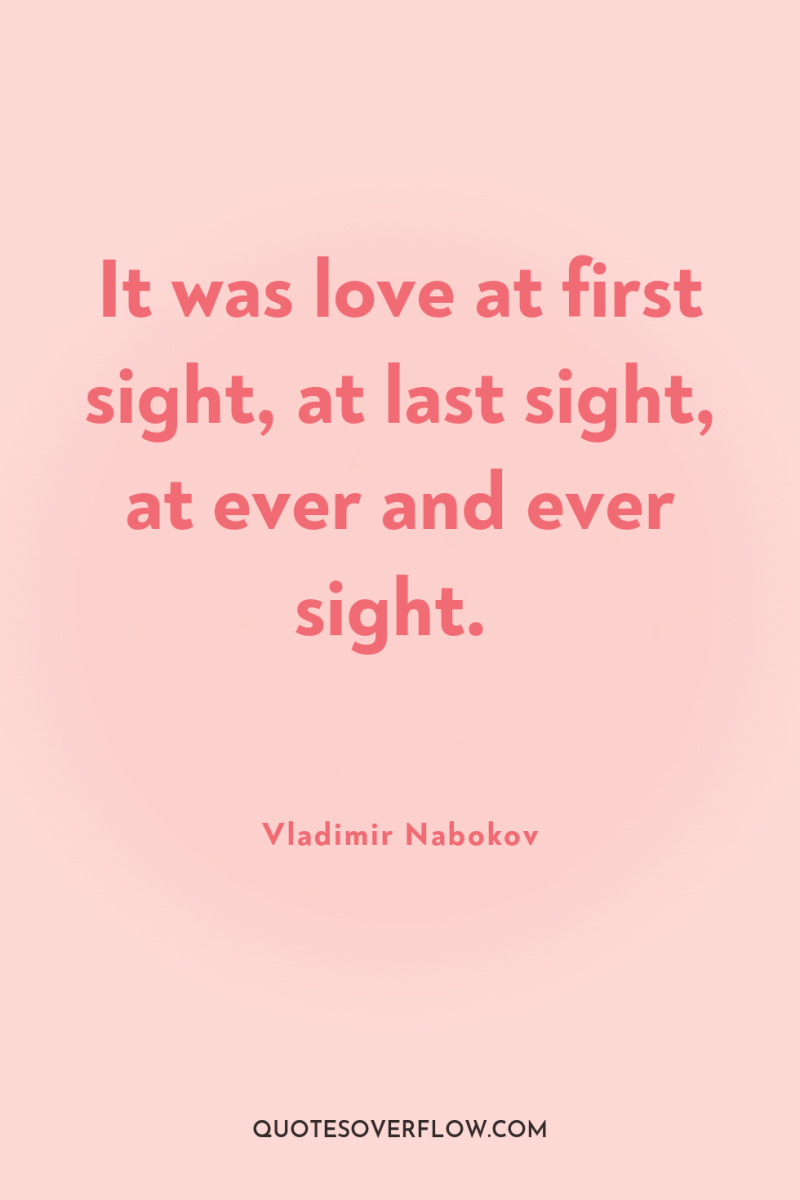
1
It was love at first sight, at last sight, at ever and ever sight.Vladimir Nabokov
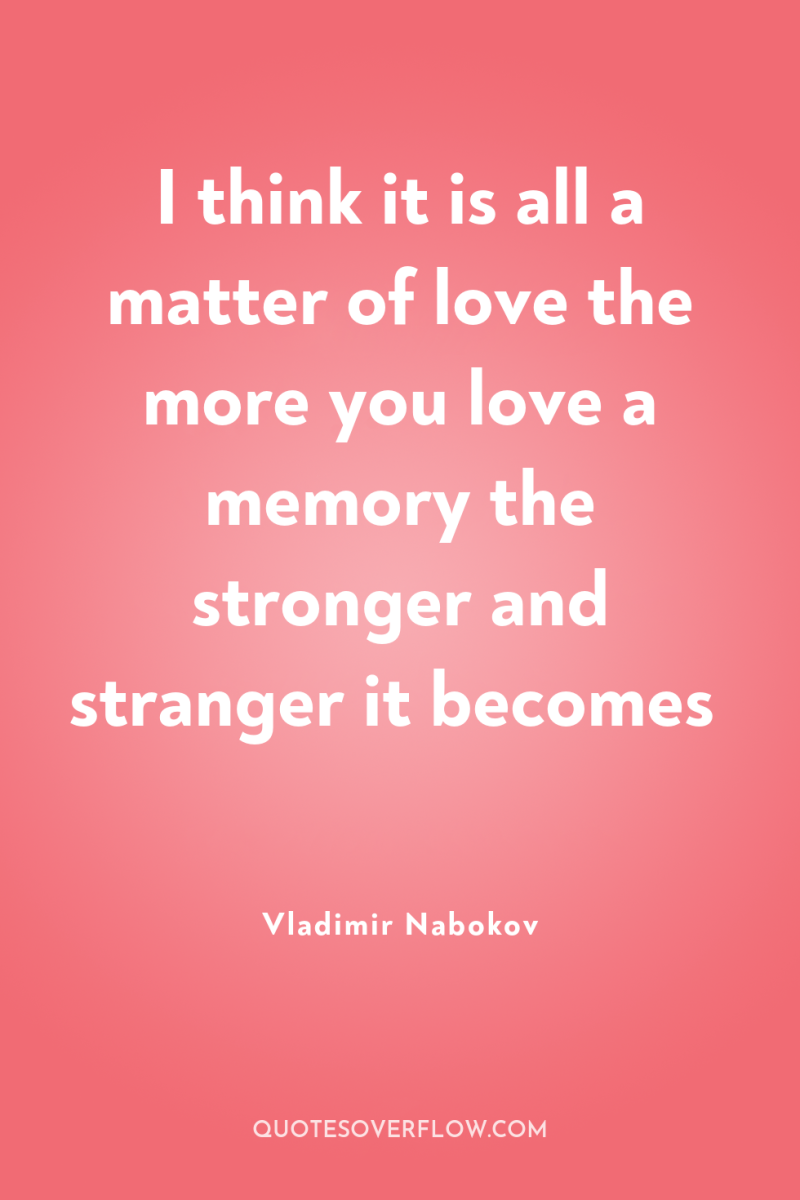
2
I think it is all a matter of love the more you love a memory the stronger and stranger it becomesVladimir Nabokov
3
I recall certain moments, let us call them icebergs in paradise, when after having had my fill of her —after fabulous, insane exertions that left me limp and azure-barred— I would gather her in my arms with, at last, a mute moan of human tenderness (her skin glistening in the neon light coming from the paved court through the slits in the blind, her soot-black lashes matted, her grave gray eyes more vacant than ever—for all the world a little patient still in the confusion of a drug after a major operation)—and the tenderness would deepen to shame and despair, and I would lull and rock my lone light Lolita in my marble arms, and moan in her warm hair, and caress her at random and mutely ask her blessing, and at the peak of this human agonized selfless tenderness (with my soul actually hanging around her naked body and ready to repent), all at once, ironically, horribly, lust would swell again—and 'oh, no, ' Lolita would say with a sigh to heaven, and the next moment the tenderness and the azure—all would be shattered.Vladimir Nabokov
4
Nothing revives the past so completely as a smell that was once associated with it.Vladimir Nabokov
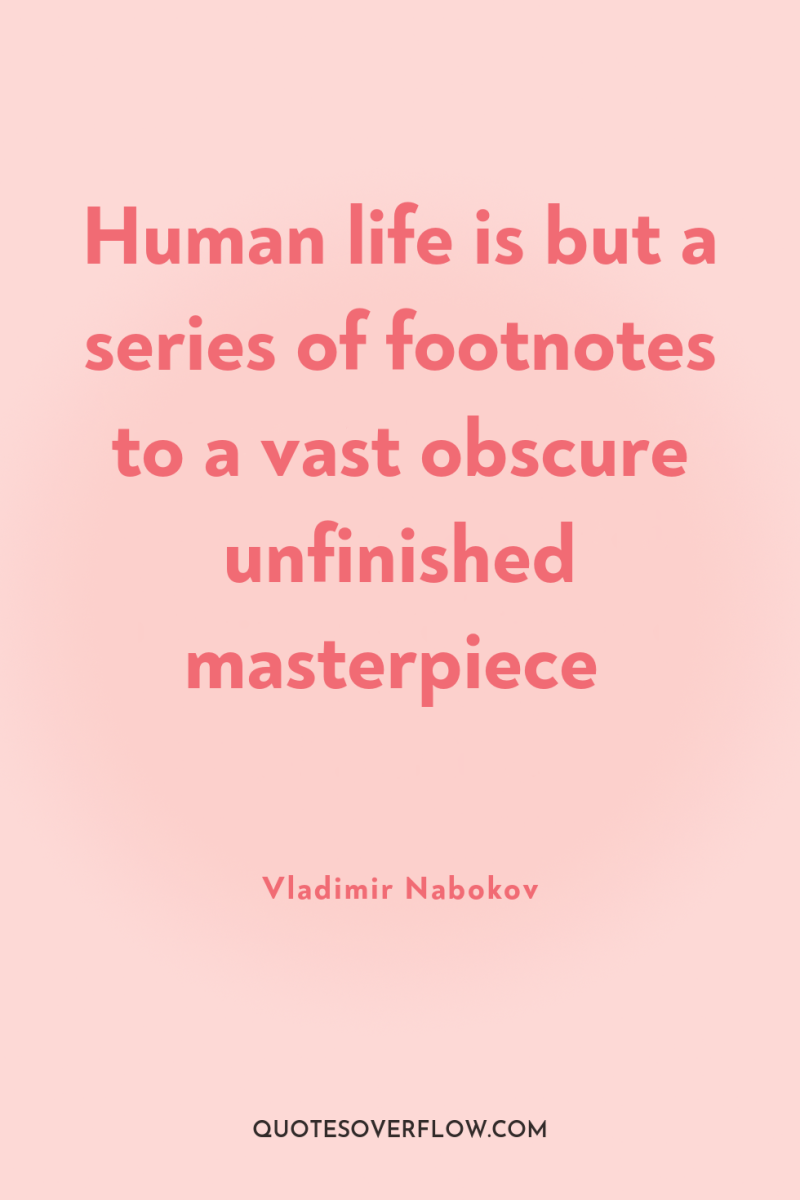
5
Human life is but a series of footnotes to a vast obscure unfinished masterpieceVladimir Nabokov
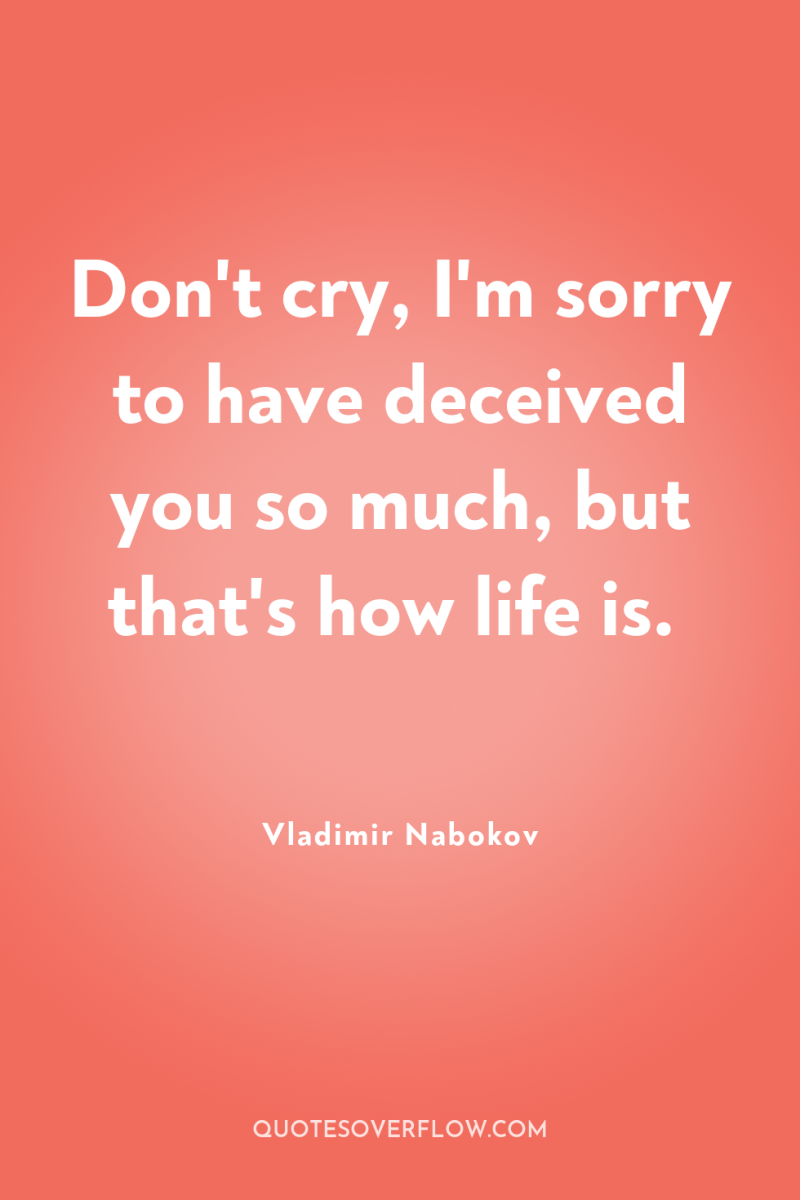
6
Don't cry, I'm sorry to have deceived you so much, but that's how life is.Vladimir Nabokov
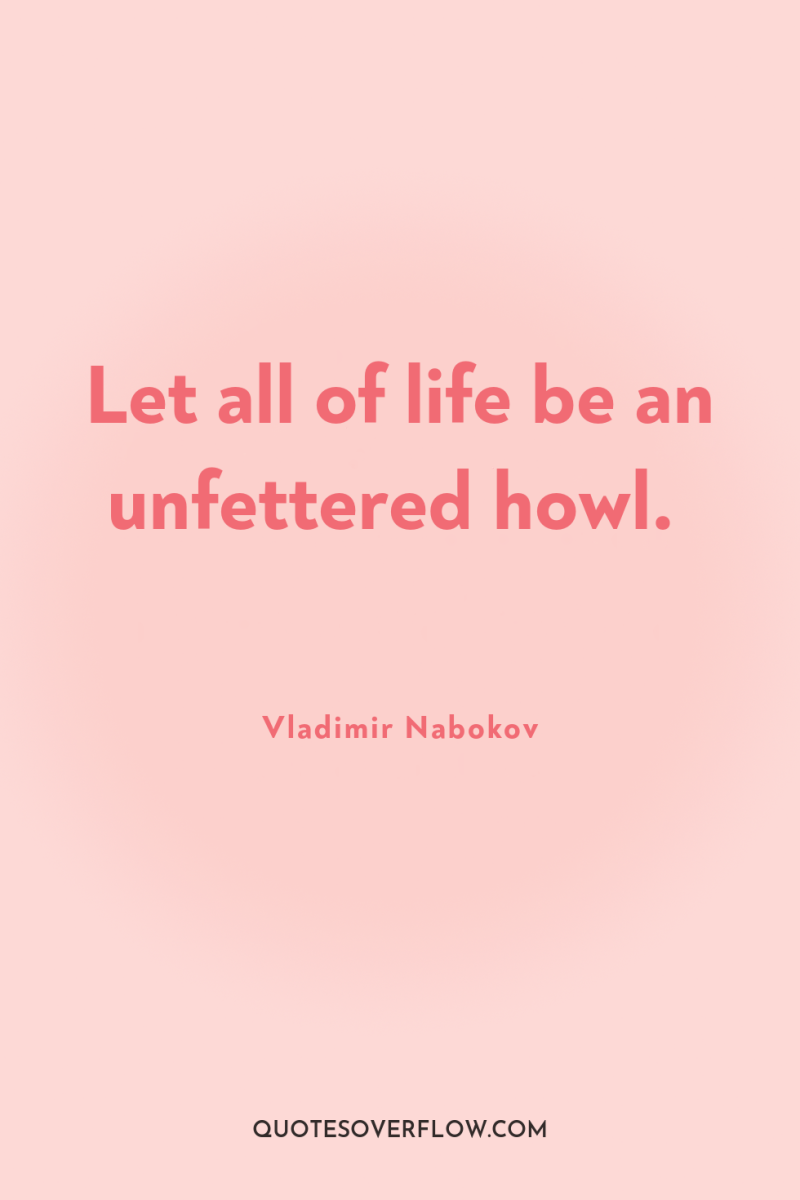
7
Let all of life be an unfettered howl.Vladimir Nabokov
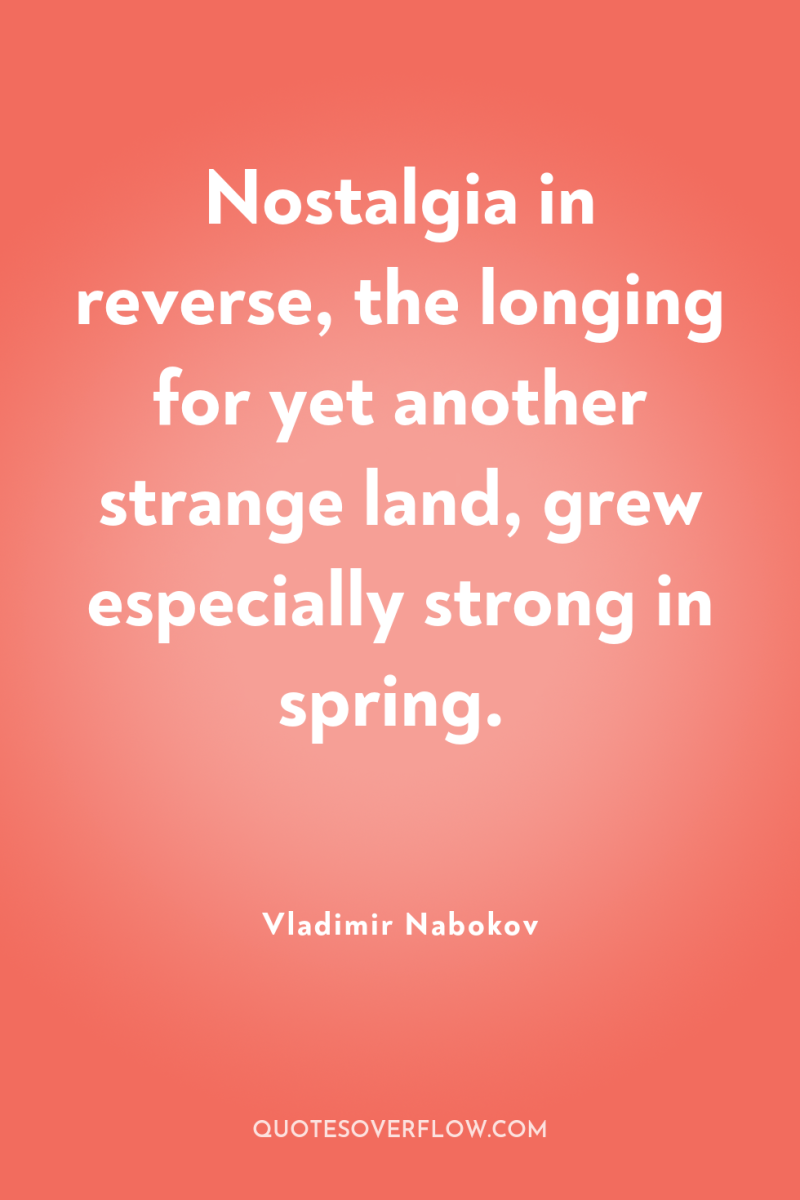
8
Nostalgia in reverse, the longing for yet another strange land, grew especially strong in spring.Vladimir Nabokov
9
The cradle rocks above an abyss, and common sense tells us that our existence is but a brief crack of light between two eternities of darkness.Vladimir Nabokov
10
We all have such fateful objects -- it may be a recurrent landscape in one case, a number in another -- carefully chosen by the gods to attract events of specific significance for us: here shall John always stumble; there shall Jane's heart always break.Vladimir Nabokov
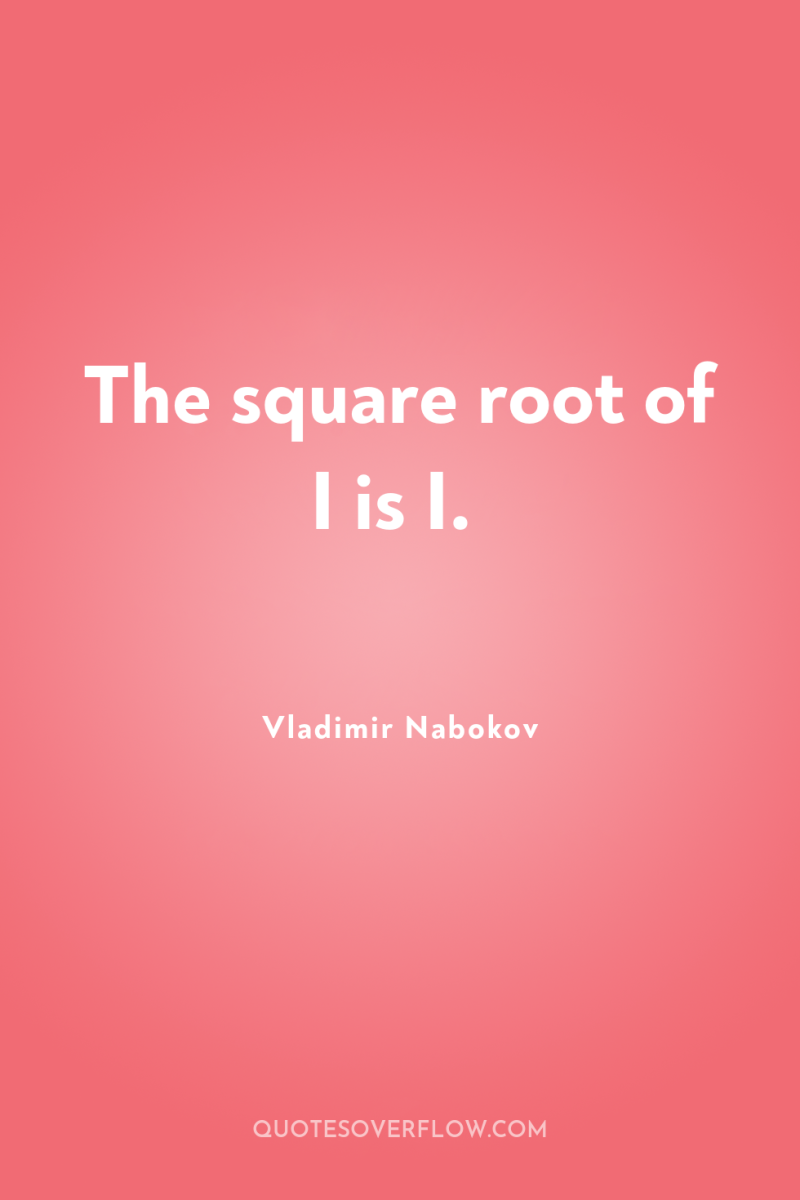
11
The square root of I is I.Vladimir Nabokov

12
All religions are based on obsolete terminology.Vladimir Nabokov
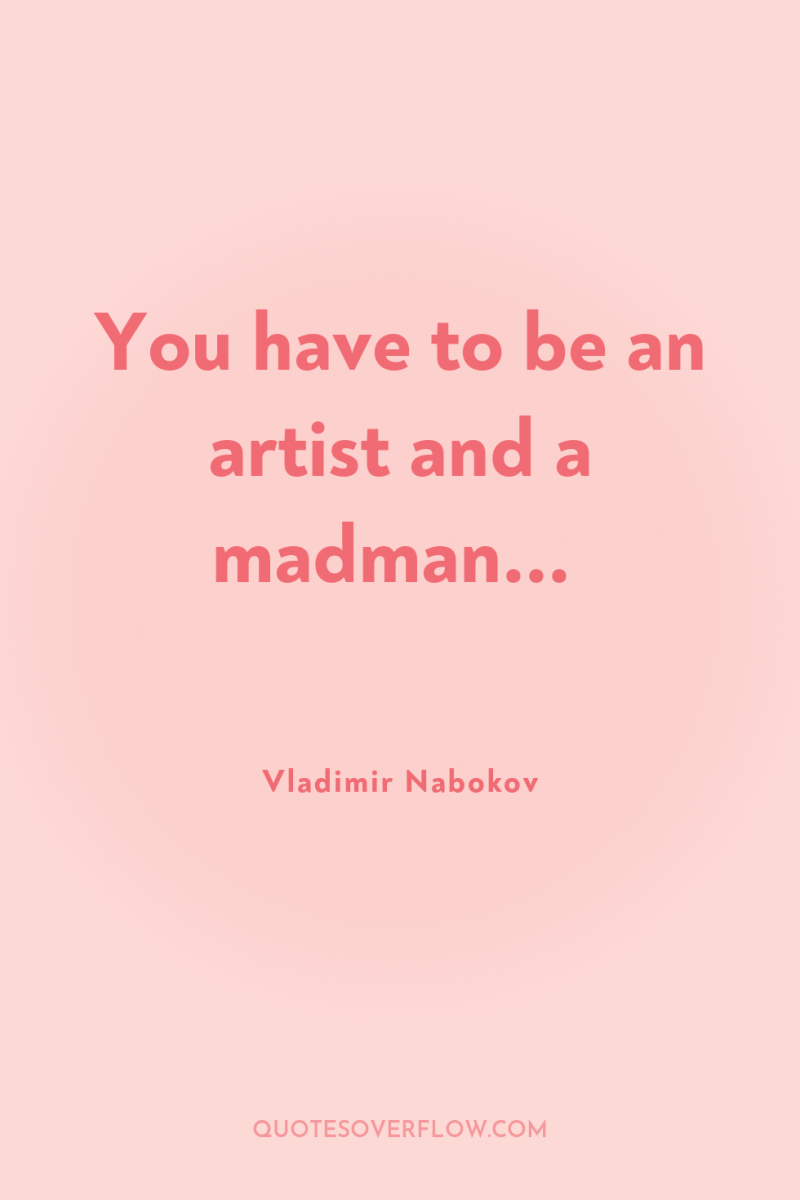
13
You have to be an artist and a madman...Vladimir Nabokov
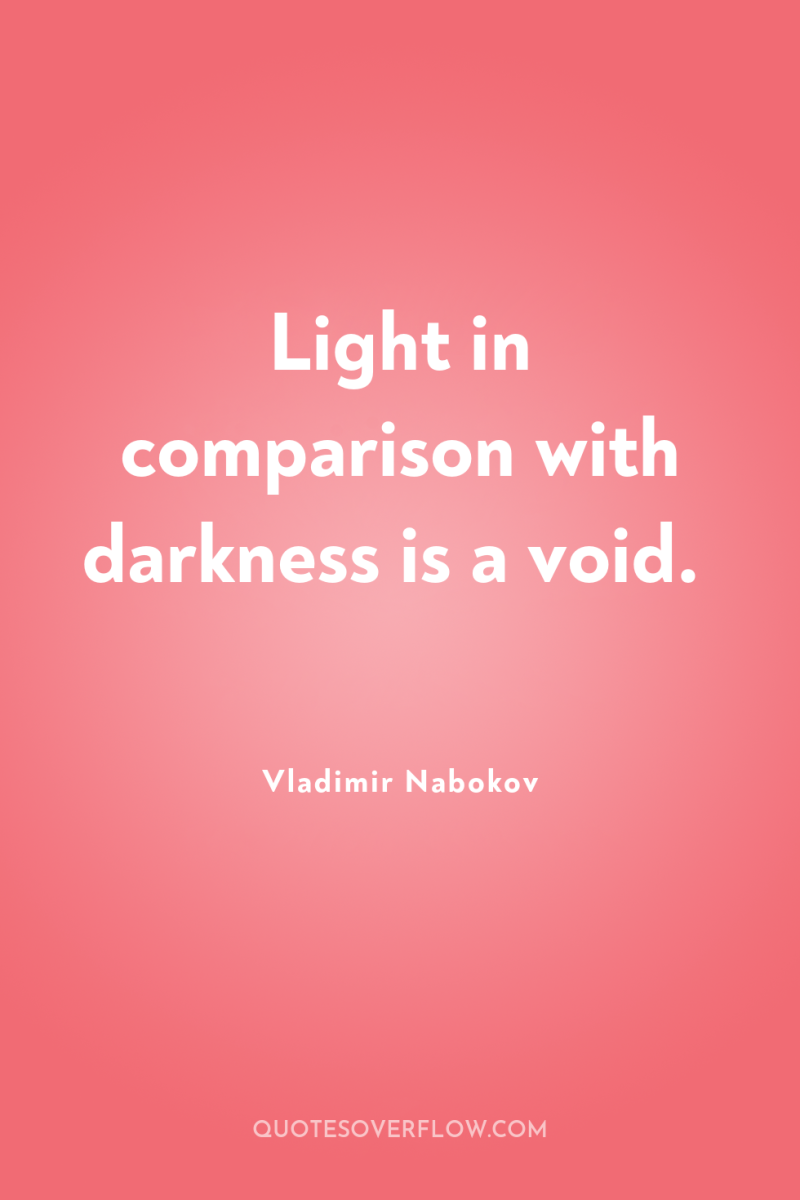
14
Light in comparison with darkness is a void.Vladimir Nabokov
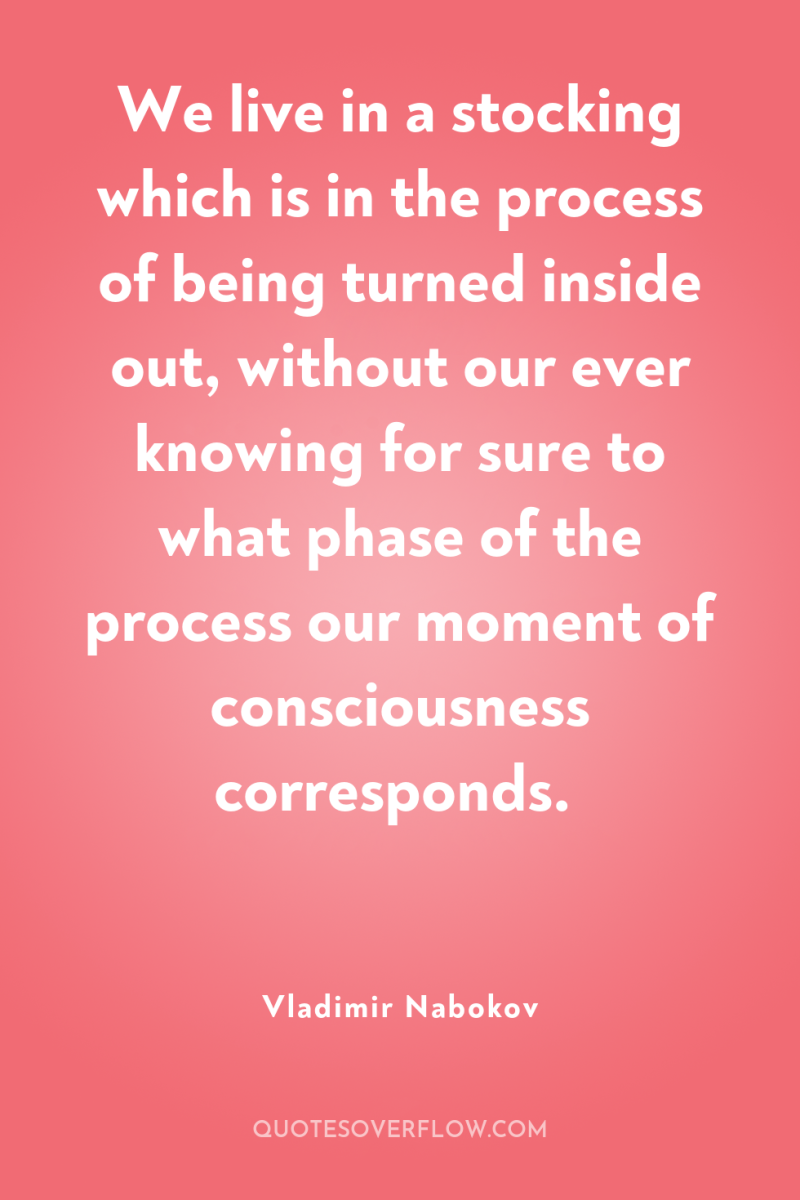
15
We live in a stocking which is in the process of being turned inside out, without our ever knowing for sure to what phase of the process our moment of consciousness corresponds.Vladimir Nabokov
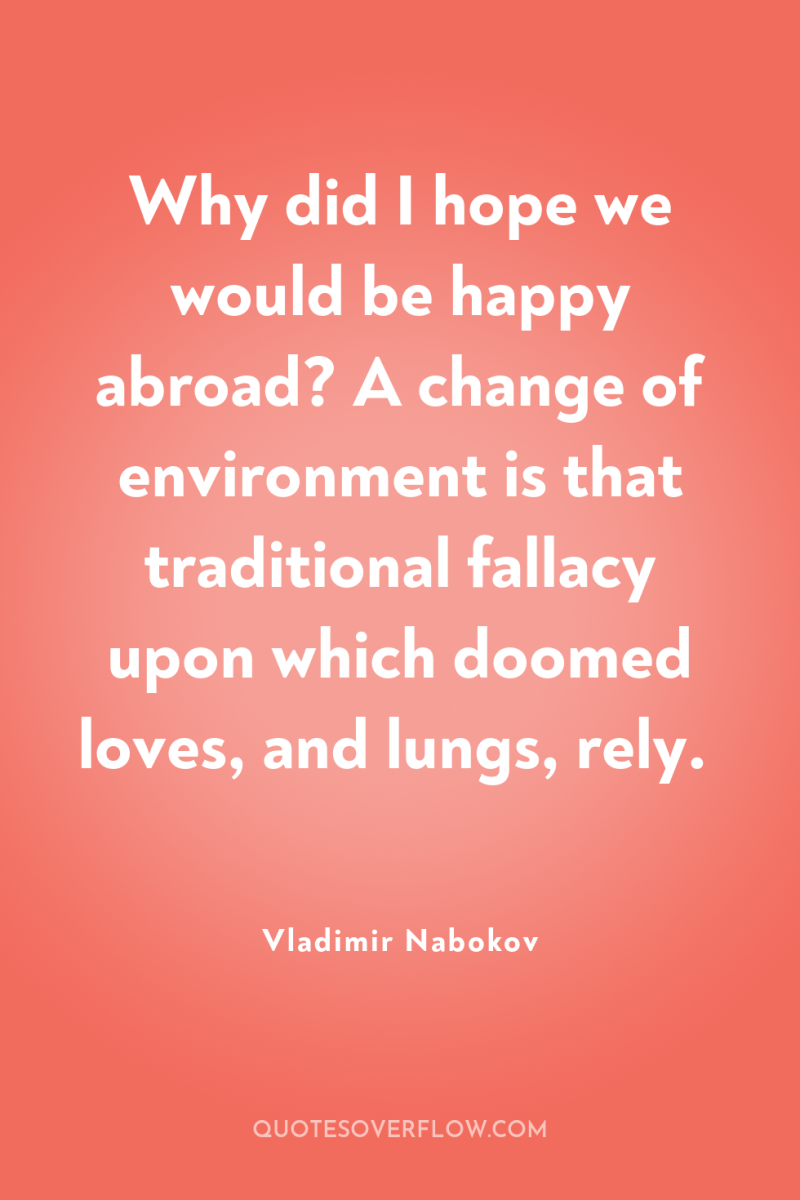
16
Why did I hope we would be happy abroad? A change of environment is that traditional fallacy upon which doomed loves, and lungs, rely.Vladimir Nabokov
17
Aunt Rosa, a fussy, angular, wild-eyed old lady, who had lived in a tremulous world of bad news, bankruptcies, train accidents, cancerous growths–until the Germans put her to death, together with all the people she had worried about.Vladimir Nabokov
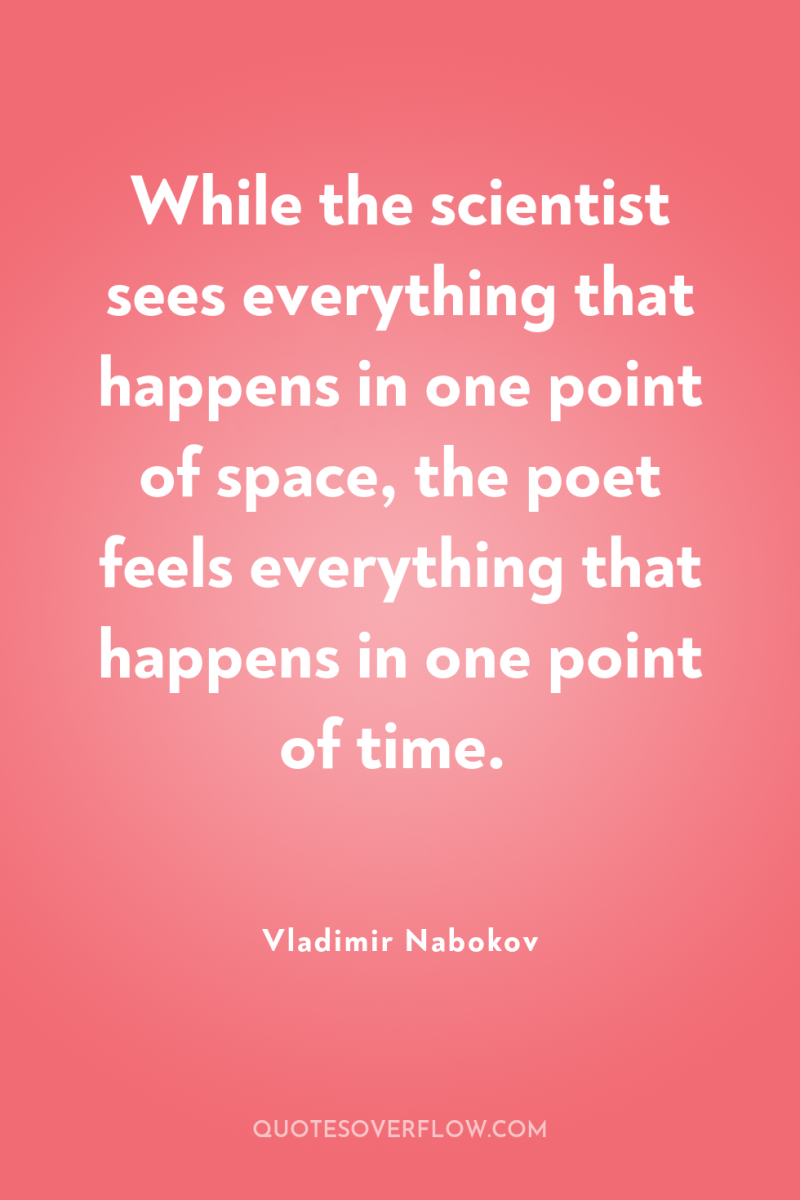
18
While the scientist sees everything that happens in one point of space, the poet feels everything that happens in one point of time.Vladimir Nabokov
19
The kind of poem I produced in those days was hardly anything more than a sign I made of being alive, of passing or having passed, or hoping to pass, through certain intense human emotions. It was a phenomenon of orientation rather than of art, thus comparable to stripes of paint on a roadside rock or to a pillared heap of stones marking a mountain trail. But then, in a sense, all poetry is positional: to try to express one's position in regard to the universe embraced by consciousness, is an immemorial urge. Tentacles, not wings, are Apollo's natural members. Vivian Bloodmark, a philosophical friend of mine, in later years, used to say that while the scientist sees everything that happens in one point of space, the poet feels everything that happens in one point of time.Vladimir Nabokov
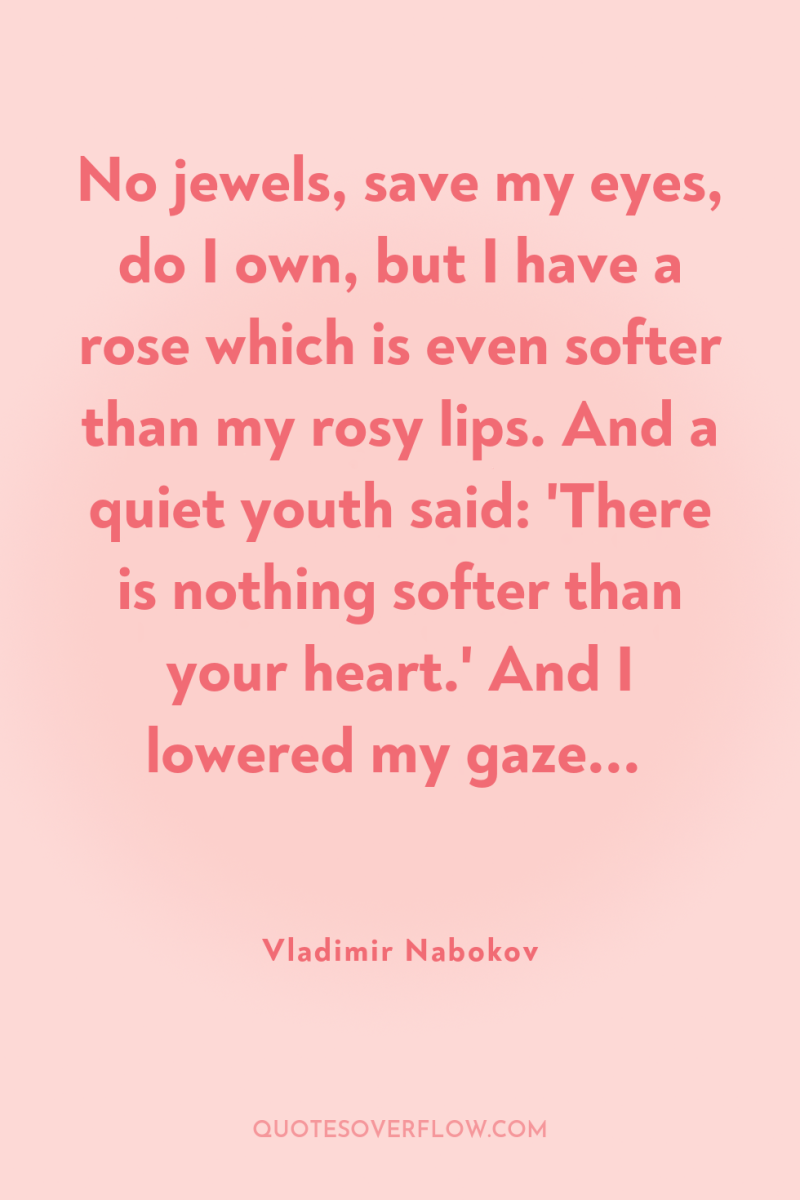
20
No jewels, save my eyes, do I own, but I have a rose which is even softer than my rosy lips. And a quiet youth said: 'There is nothing softer than your heart.' And I lowered my gaze...Vladimir Nabokov
21
- A sentyment staje siÄâ„¢ uciążliwy. W koÅ„cu jest coÅ› nazbyt fizycznego w próbie zachowania czÄ…stki dzieciÅ„stwa na swoim mostku. - Nie pan pierwszy sprowadza wiarÄâ„¢ do zmysÅ‚u dotyku.Vladimir Nabokov
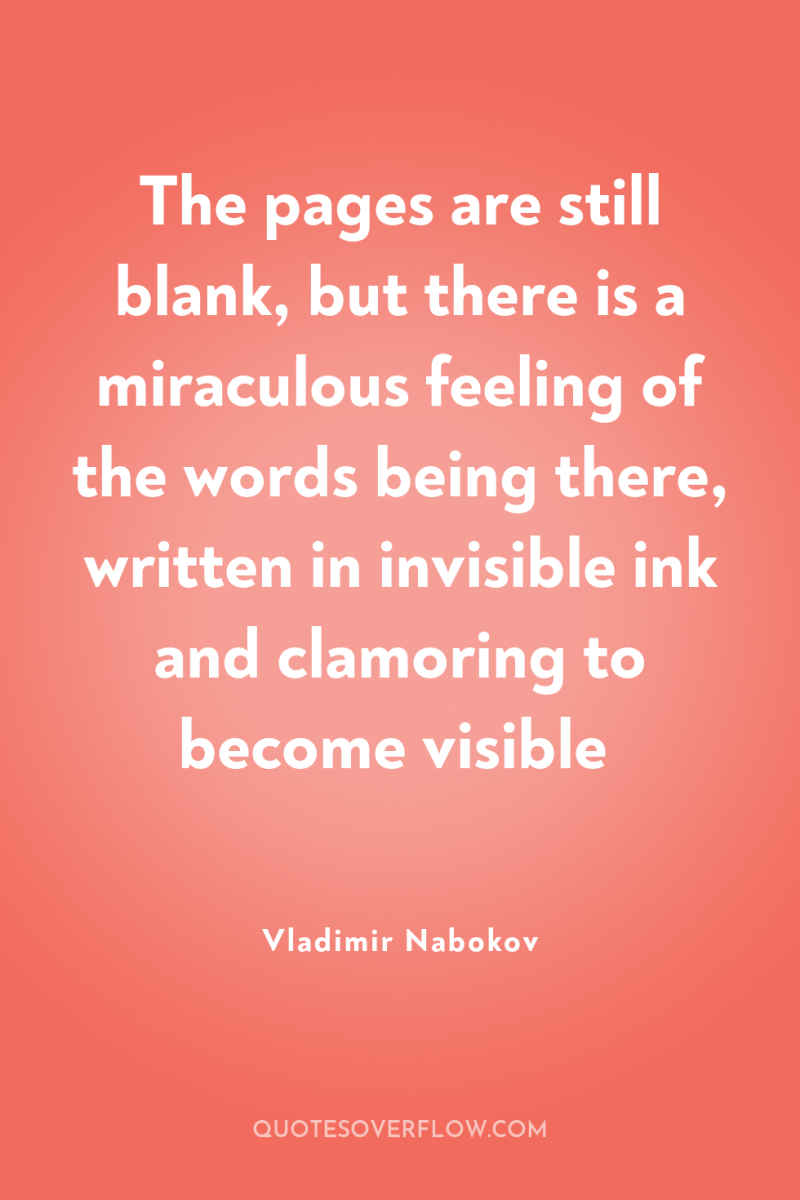
22
The pages are still blank, but there is a miraculous feeling of the words being there, written in invisible ink and clamoring to become visibleVladimir Nabokov
23
Literature was not born the day when a boy crying "wolf, wolf" came running out of the Neanderthal valley with a big gray wolf at his heels; literature was born on the day when a boy came crying "wolf, wolf" and there was no wolf behind him.Vladimir Nabokov
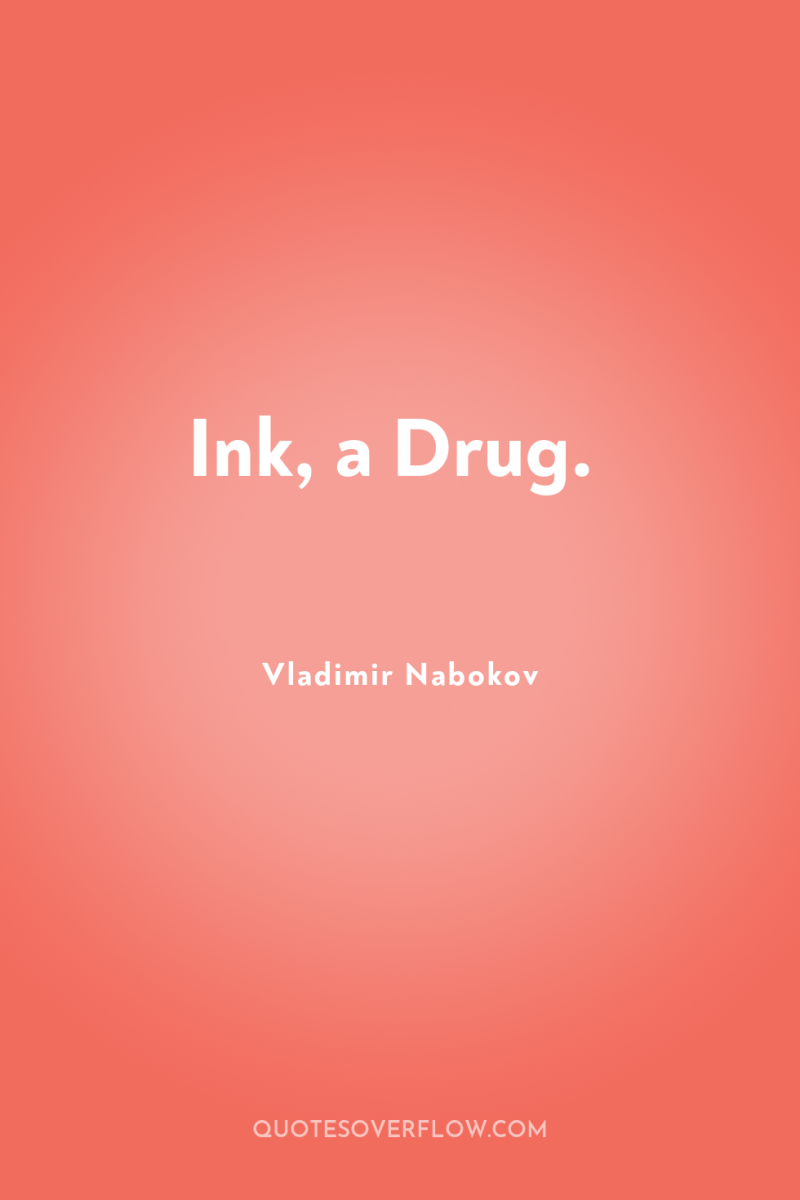
24
Ink, a Drug.Vladimir Nabokov
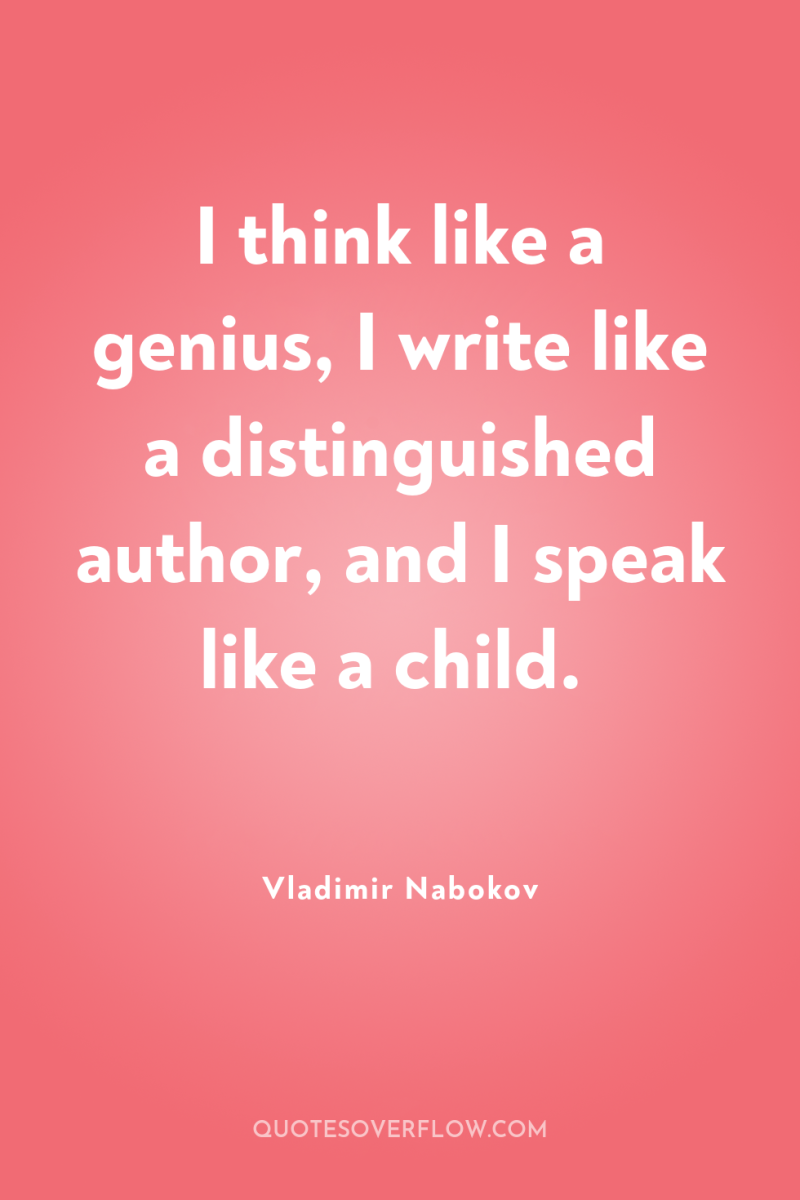
25
I think like a genius, I write like a distinguished author, and I speak like a child.Vladimir Nabokov
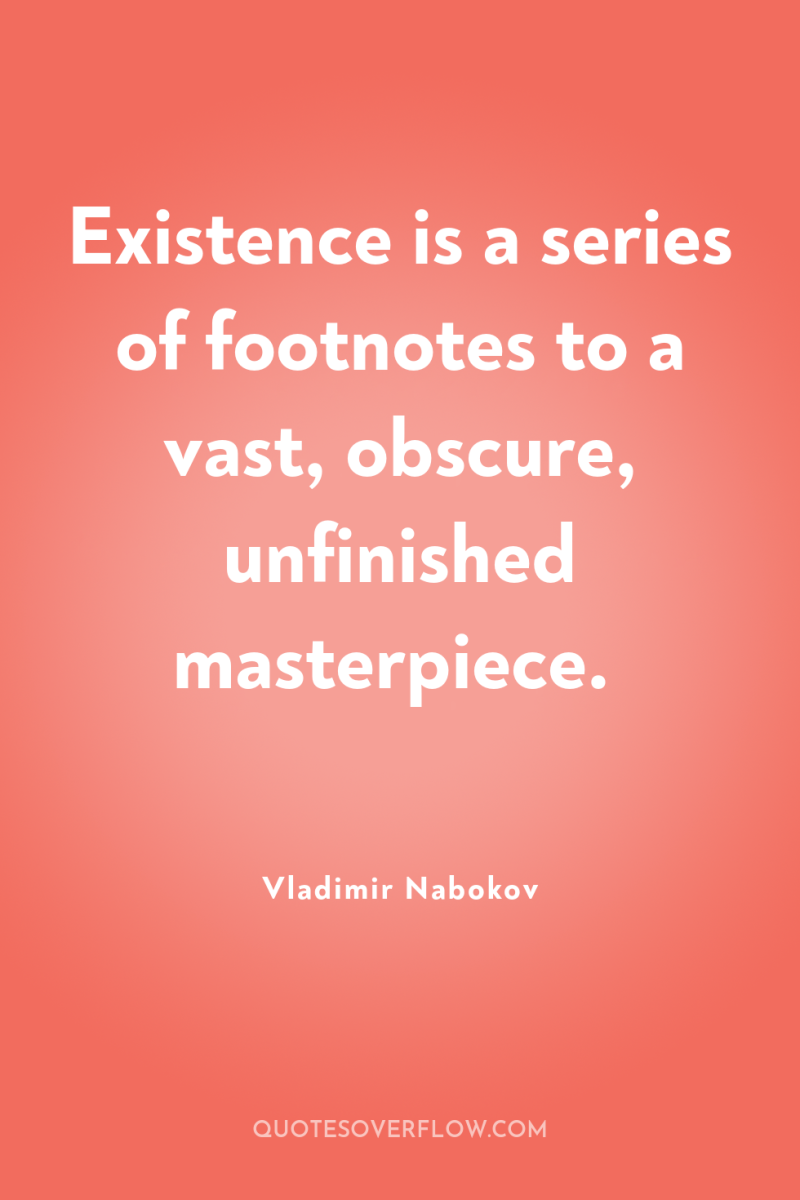
26
Existence is a series of footnotes to a vast, obscure, unfinished masterpiece.Vladimir Nabokov
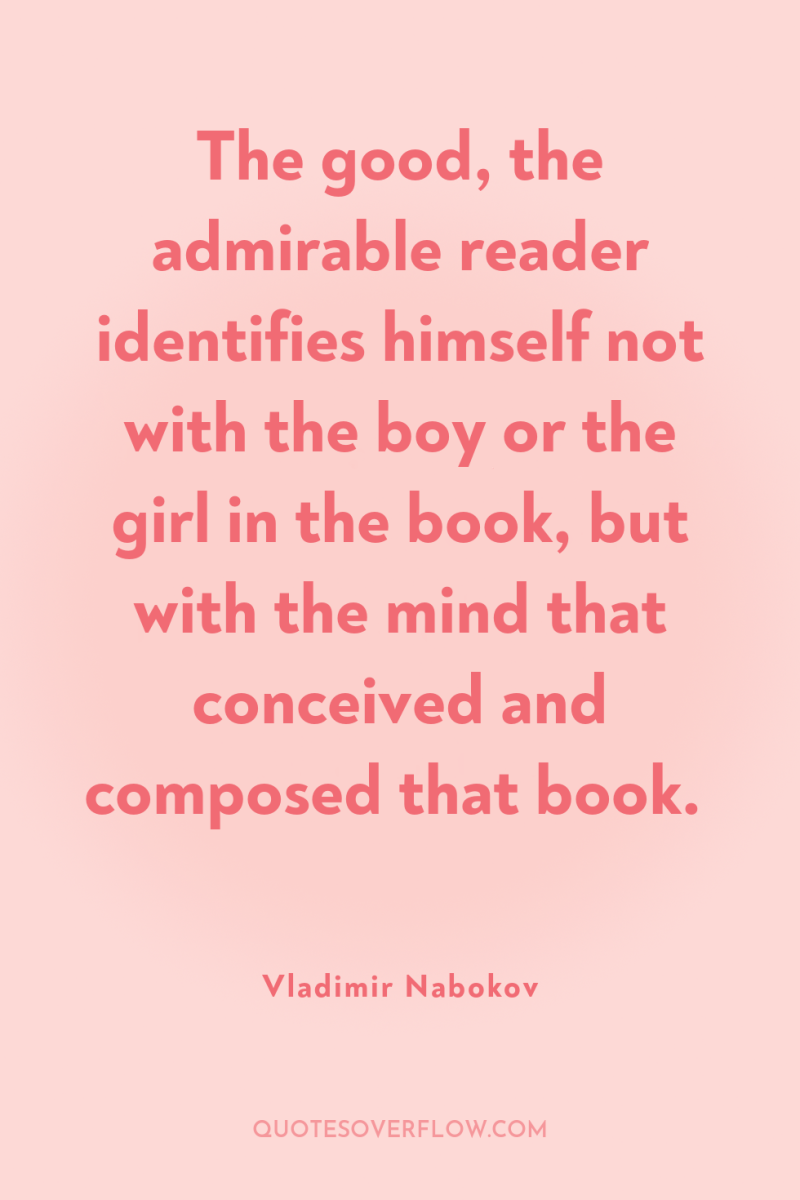
27
The good, the admirable reader identifies himself not with the boy or the girl in the book, but with the mind that conceived and composed that book.Vladimir Nabokov
28
And this is the only immortality you and i may share, my Lolita.Vladimir Nabokov
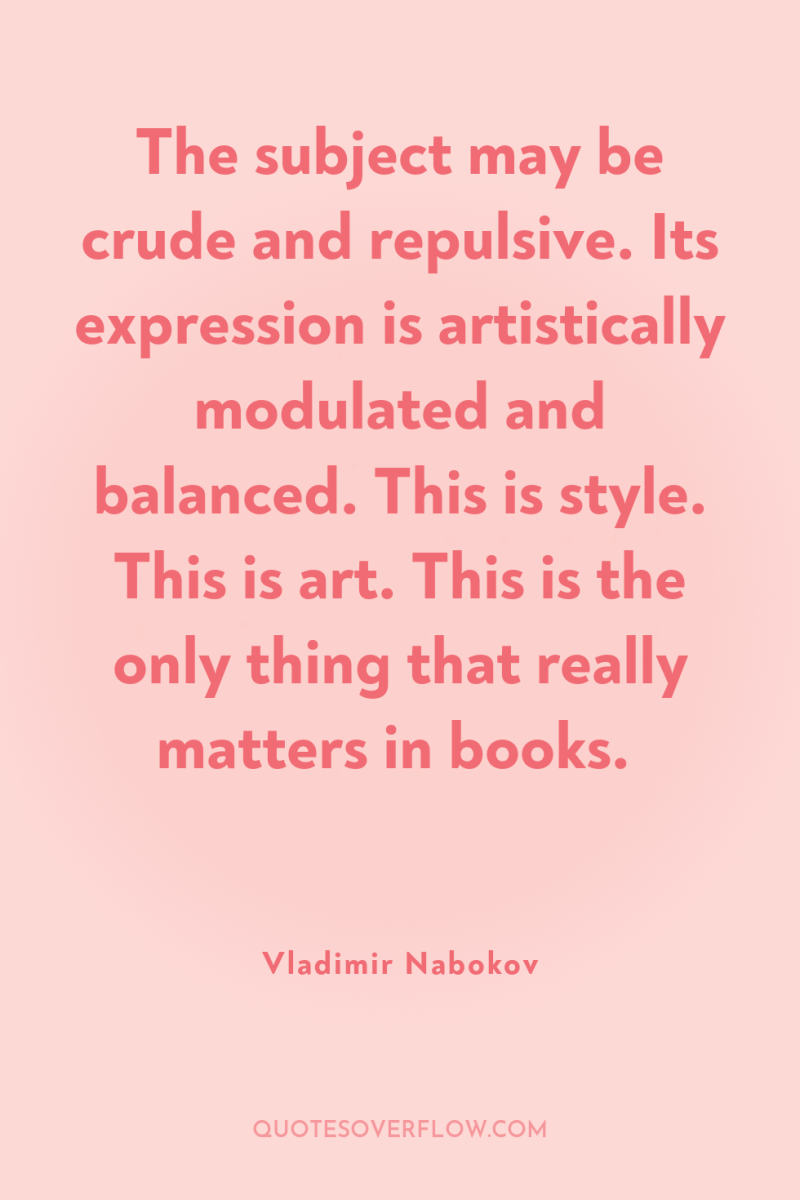
29
The subject may be crude and repulsive. Its expression is artistically modulated and balanced. This is style. This is art. This is the only thing that really matters in books.Vladimir Nabokov
30
The pale organisms of literary heroes feeding under the author's supervision swell gradually with the reader's lifeblood; so that the genius of a writer consists in giving them the faculty to adapt themselves to that - not very appetizing - food and thrive on it, sometimes for centuries.Vladimir Nabokov
31
And speaking of this wonderful machine:[840] I’m puzzled by the difference between, the kind Which goes on solely in the poet’s mind, A testing of performing words, while he, The other kind, much more decorous, when He’s in his study writing with a pen. In method B the hand supports the thought, The abstract battle is concretely fought. The pen stops in mid-air, then swoops to bar[850]Â A canceled sunset or restore a star, And thus it physically guides the phrase Toward faint daylight through the inky maze. is agony! The brain Is soon enclosed in a steel cap of pain. A muse in overalls directs the drill Which grinds and which no effort of the will Can interrupt, while the automaton Is taking off what he has just put on Or walking briskly to the corner store [860]Â To buy the paper he has read before.Vladimir Nabokov
32
I am looking at him, I am witnessing a unique physiological phenomenon: John Shade perceiving and transforming the world, taking it in and taking it apart, re-combining its elements in the very process of storing them up so as to produce at some unspecified date an organic miracle, a fusion of image and music, a line of verse.Vladimir Nabokov
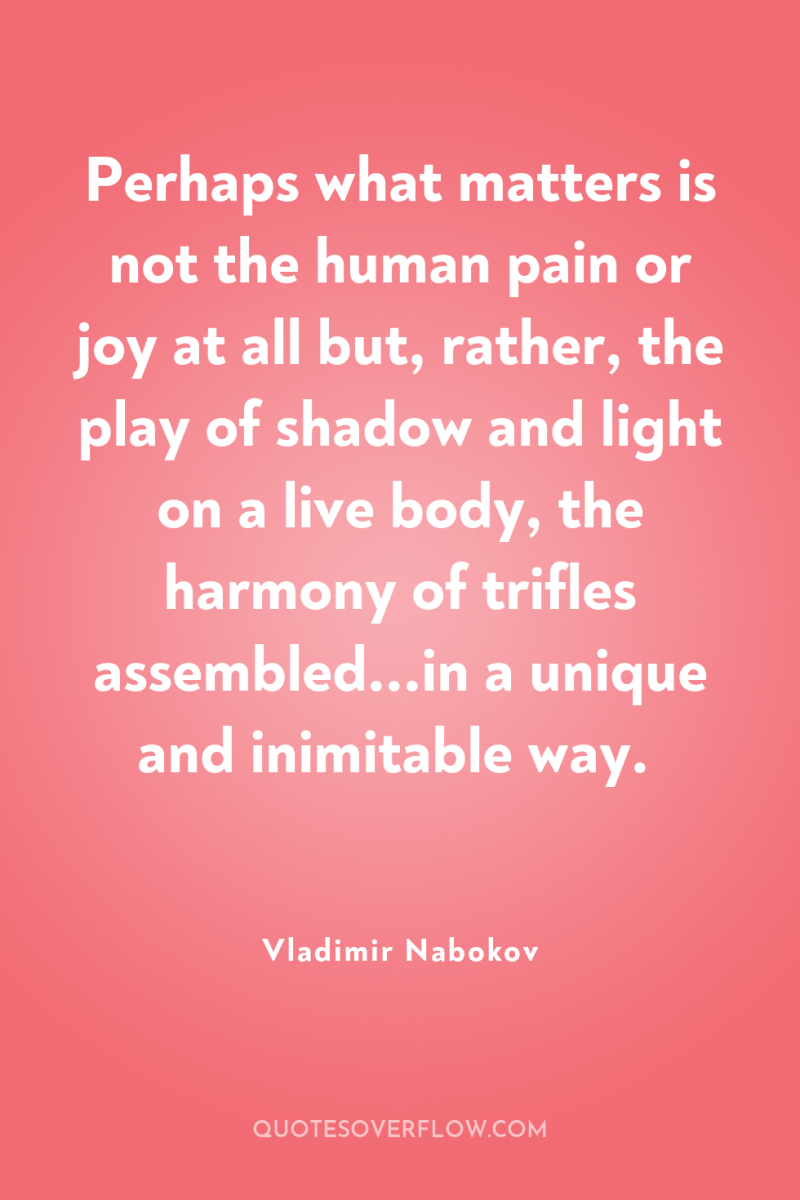
33
Perhaps what matters is not the human pain or joy at all but, rather, the play of shadow and light on a live body, the harmony of trifles assembled...in a unique and inimitable way.Vladimir Nabokov
34
The village schoolmaster took us for instructive walks ('what you hear is the sound of a scythe being sharpened' ; 'that field there will be given a rest next season ';'oh, just a small bird...no special name '; 'if that peasant is drunk, it is because he is poor ') 71Vladimir Nabokov
35
I confess I do not believe in time. I like to fold my magic carpet, after use, in such a way as to superimpose one part of the pattern upon another. Let visitors trip. And the highest enjoyment of timelessness―in a landscape selected at random―is when I stand among rare butterflies and their food plants. This is ecstasy, and behind the ecstasy is something else, which is hard to explain. It is like a momentary vacuum into which rushes all that I love. A sense of oneness with sun and stone. A thrill of gratitude to whom it may concern―to the contrapuntal genius of human fate or to tender ghosts humoring a lucky mortal.Vladimir Nabokov
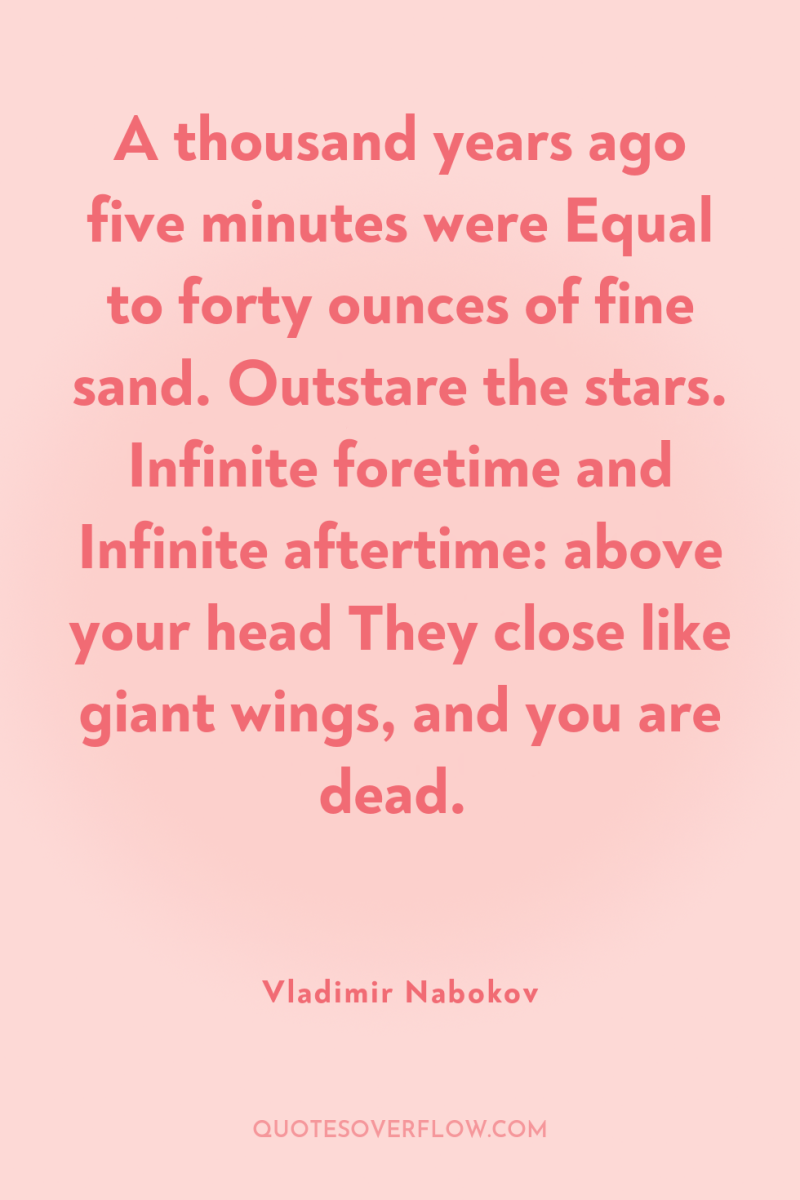
36
A thousand years ago five minutes were Equal to forty ounces of fine sand. Outstare the stars. Infinite foretime and Infinite aftertime: above your head They close like giant wings, and you are dead.Vladimir Nabokov
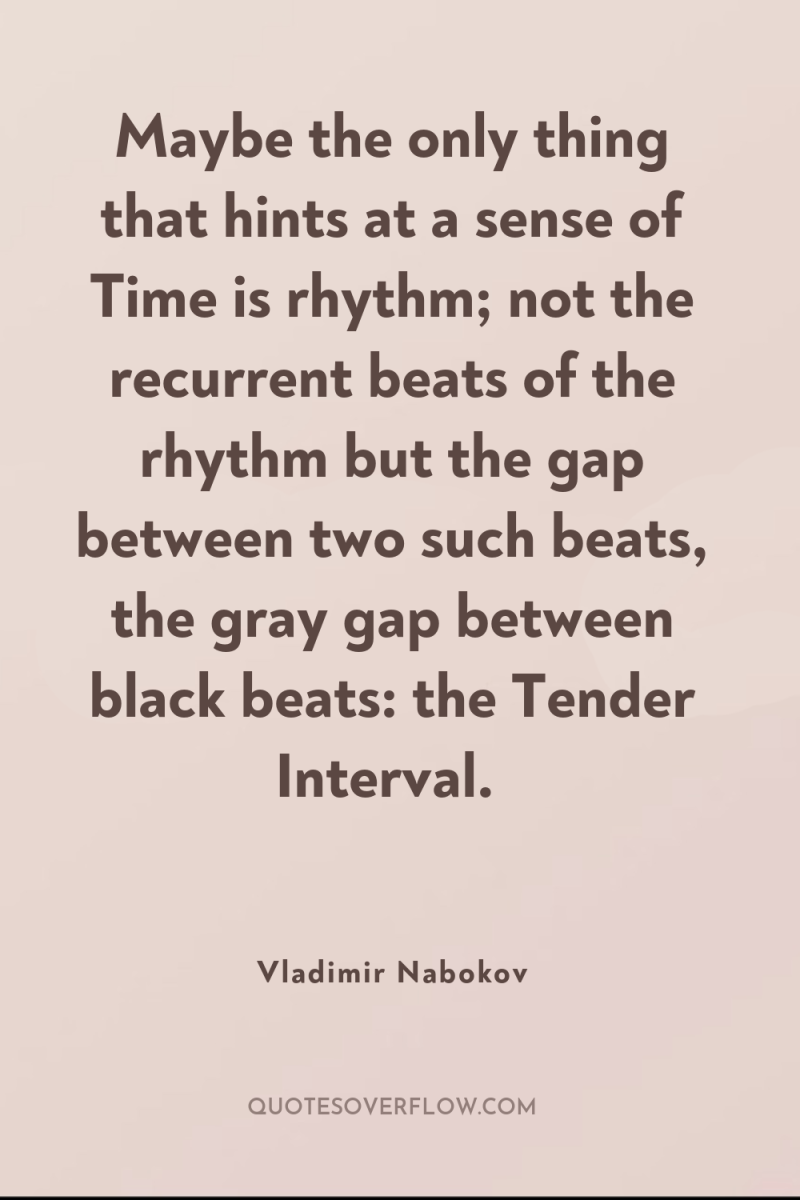
37
Maybe the only thing that hints at a sense of Time is rhythm; not the recurrent beats of the rhythm but the gap between two such beats, the gray gap between black beats: the Tender Interval.Vladimir Nabokov
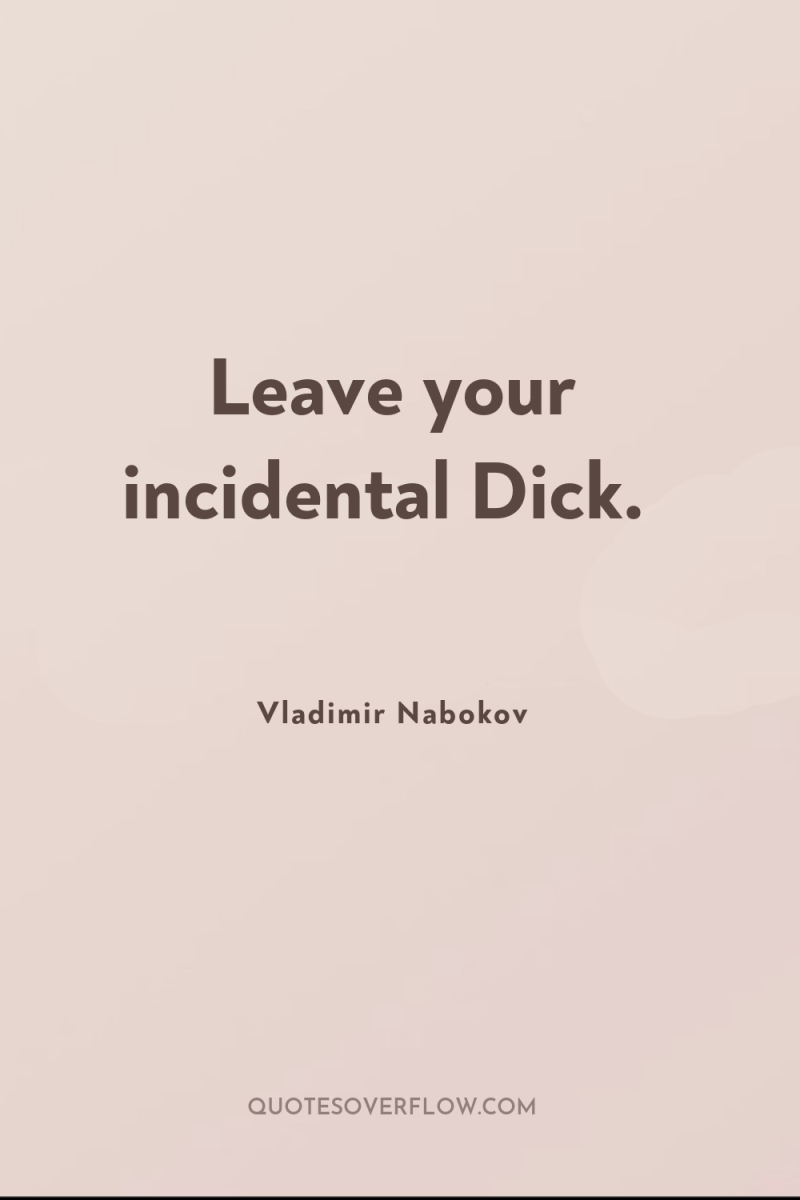
38
Leave your incidental Dick.Vladimir Nabokov
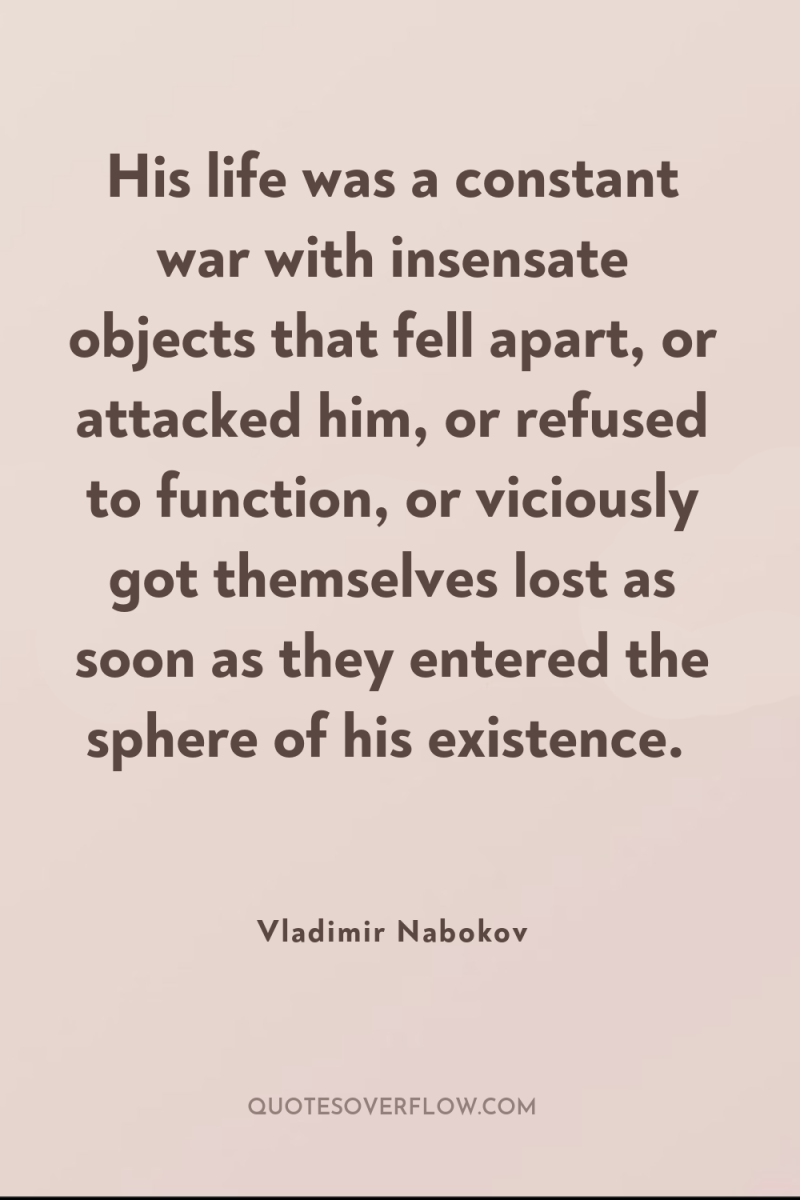
39
His life was a constant war with insensate objects that fell apart, or attacked him, or refused to function, or viciously got themselves lost as soon as they entered the sphere of his existence.Vladimir Nabokov
40
Literature, real literature, must not be gulped down like some potion which may be good for the heart or good for the brain – the brain, that stomach of the soul. Literature must be taken and broken to bits, pulled apart, squashed – then its lovely reek will be smelt in the hollow of the palm, it will be munched and rolled upon the tongue with relish; then, and only then, its rare flavor will be appreciated at its true worth and the broken and crushed parts will again come together in your mind and disclose the beauty of a unity to which you have contributed something of your own blood.Vladimir Nabokov
41
We are absurdly accustomed to the miracle of a few written signs being able to contain immortal imagery, involutions of thought, new worlds with live people, speaking, weeping, laughing. We take it for granted so simply that in a sense, by the very act of brutish routine acceptance, we undo the work of the ages, the history of the gradual elaboration of poetical description and construction, from the treeman to Browning, from the caveman to Keats. What if we awake one day, all of us, and find ourselves utterly unable to read? I wish you to gasp not only at what you read but at the miracle of its being readable.Vladimir Nabokov
42
We are liable to miss the best of life if we do not know how to tingle, if we do not learn to hoist ourselves just a little higher than we generally are in order to sample the rarest and ripest fruit of art which human thought has to offer.Vladimir Nabokov
43
But after all we are not children, not illiterate juvenile delinquents, not English public school boys who after a night of homosexual romps have to endure the paradox of reading the Ancients in expurgated versions.Vladimir Nabokov
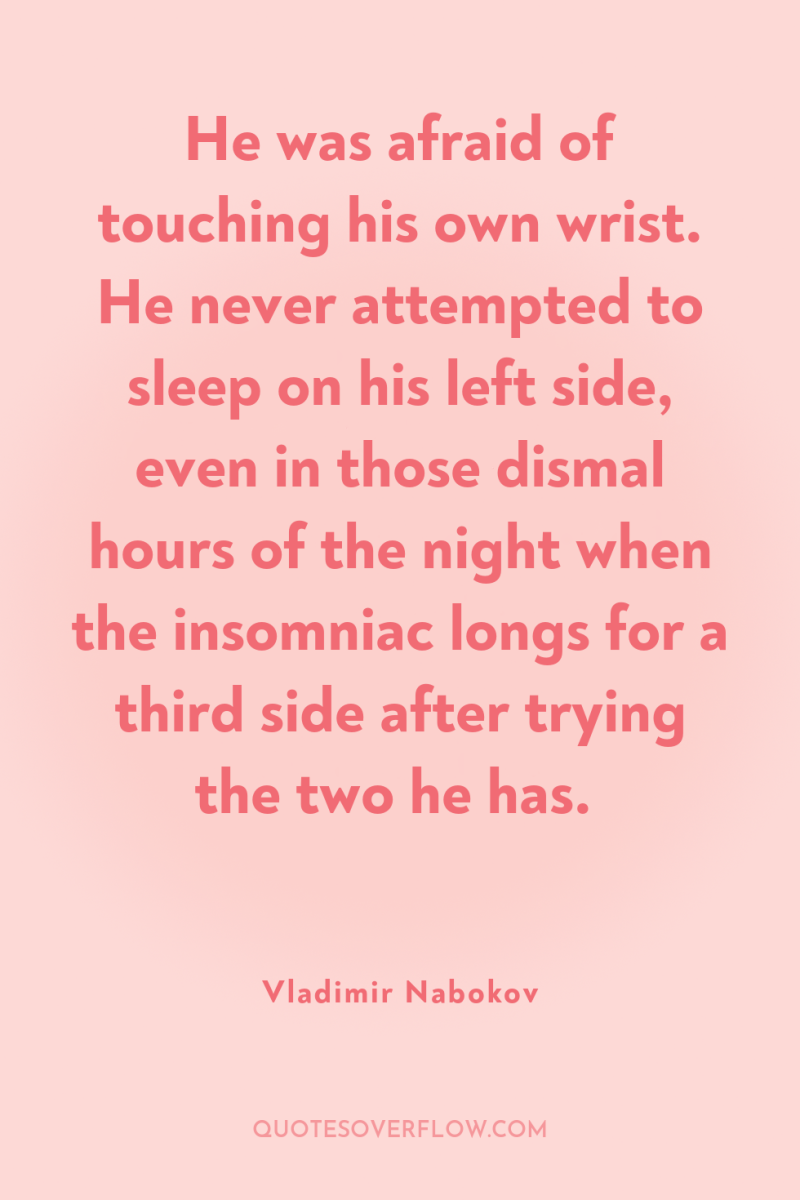
44
He was afraid of touching his own wrist. He never attempted to sleep on his left side, even in those dismal hours of the night when the insomniac longs for a third side after trying the two he has.Vladimir Nabokov
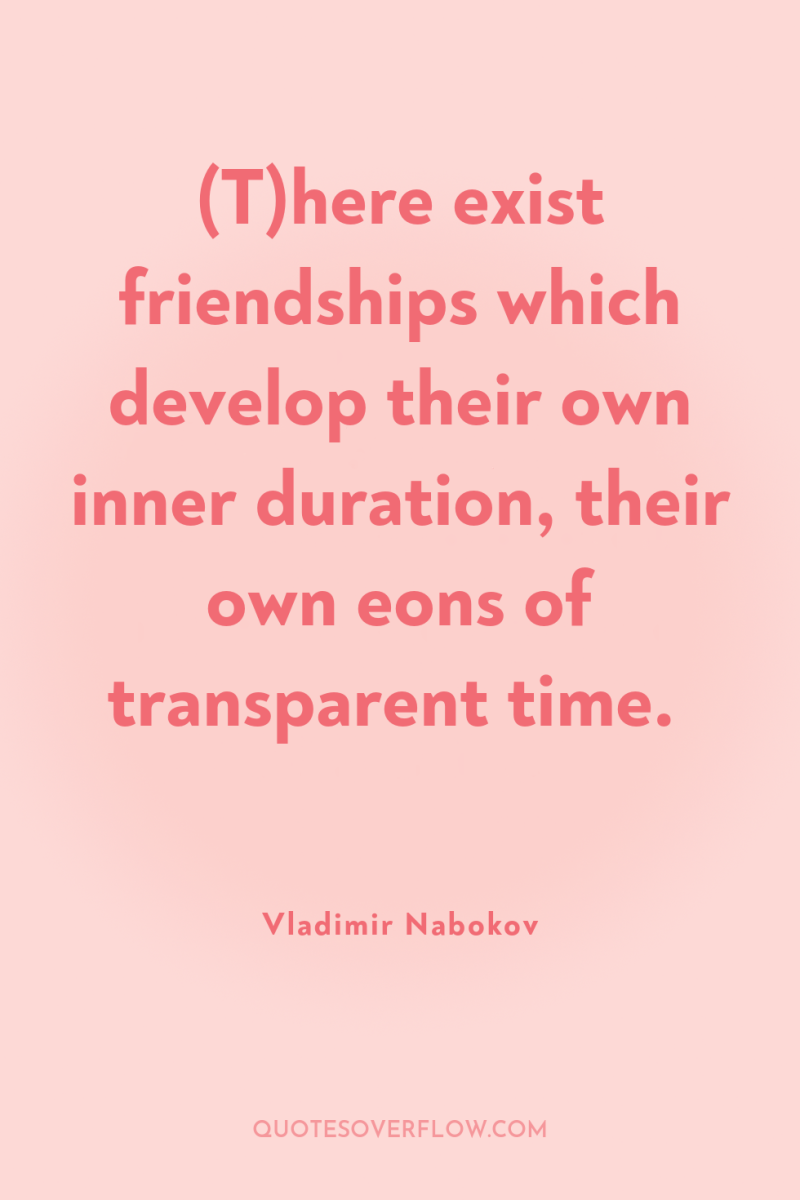
45
(T)here exist friendships which develop their own inner duration, their own eons of transparent time.Vladimir Nabokov
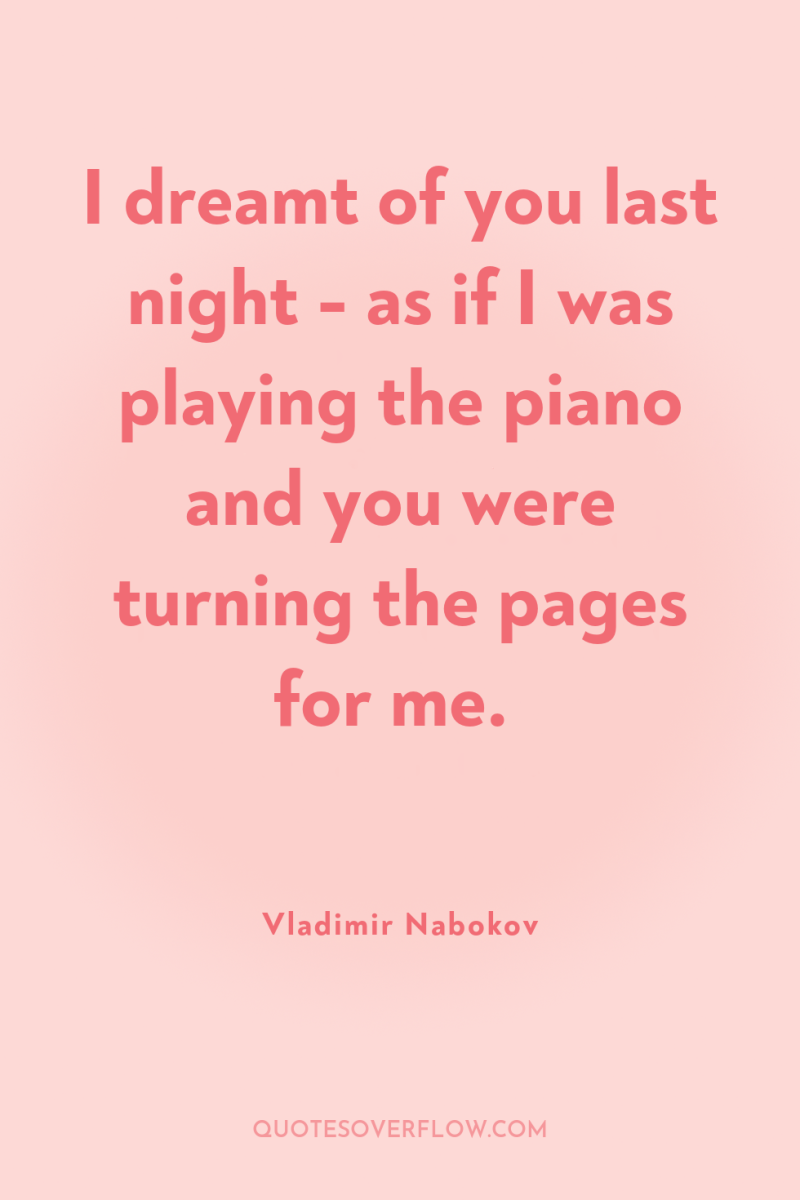
46
I dreamt of you last night - as if I was playing the piano and you were turning the pages for me.Vladimir Nabokov
47
I liked, as I like still, to make words look self-conscious and foolish, to bind them by mock marriage of a pun, to turn them inside out, to come upon them unawares. What is this jest in majesty? This ass in passion? How do god and devil combine to form a live dog?Vladimir Nabokov
48
And Schyogolev launched on a discussion of politics. Like many unpaid windbags he thought that he could combine the reports he read in the papers by paid windbags into an orderly scheme, upon following which a logical and sober mind (in this case his mind) could with no effort explain and foresee a multitude of world events. The names of countries and of their leading representatives became in his hands something in the nature of labels for more or less full but essentially identical vessels, whose contents he poured this way and that. France was AFRAID of something or other and therefore would never allow it. England was AIMING at something. This statesman CRAVED a rapprochement, while that one wanted to increase his PRESTIGE. Someone was PLOTTING and someone was STRIVING for something. In short, the world Schyogolev created came out as some kind of collection of limited, humorless, faceless and abstract bullies, and the more brains, cunning and circumspection he found in their mutual activities the more stupid, vulgar and simple his world became.Vladimir Nabokov
49
Listen–I want to run all my life, screaming at the top of my lungs. Let all of life be an unfettered howl. Like the crowd greeting the gladiator. Don’t stop to think, don’t interrupt the scream, exhale, release life’s rapture. Everything is blooming. Everything is flying. Everything is screaming, choking on its screams. Laughter. Running. Let-down hair. That is all there is to life.Vladimir Nabokov
50
Everything in the world is beautiful, but Man only recognizes beauty if he sees it either seldom or from afar. Listen, today we are gods! Our blue shadows are enormous! We move in a gigantic, joyful world!Vladimir Nabokov
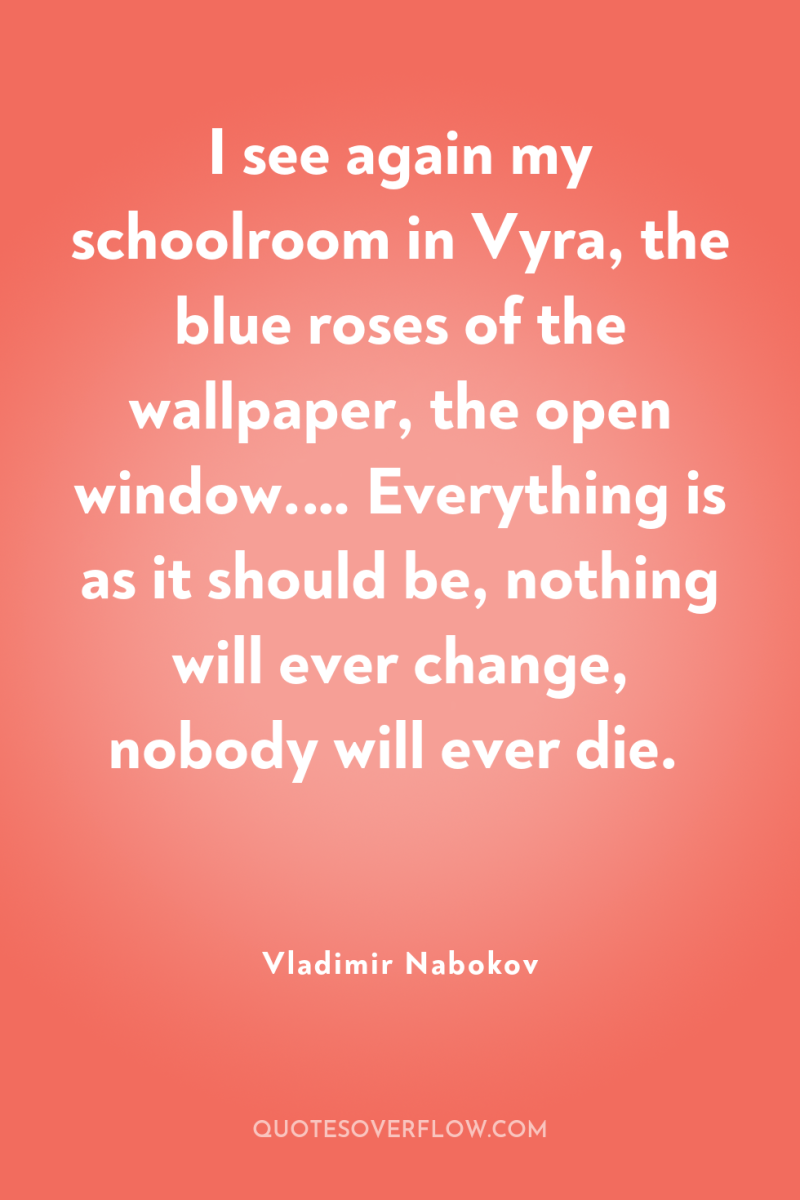
51
I see again my schoolroom in Vyra, the blue roses of the wallpaper, the open window.… Everything is as it should be, nothing will ever change, nobody will ever die.Vladimir Nabokov
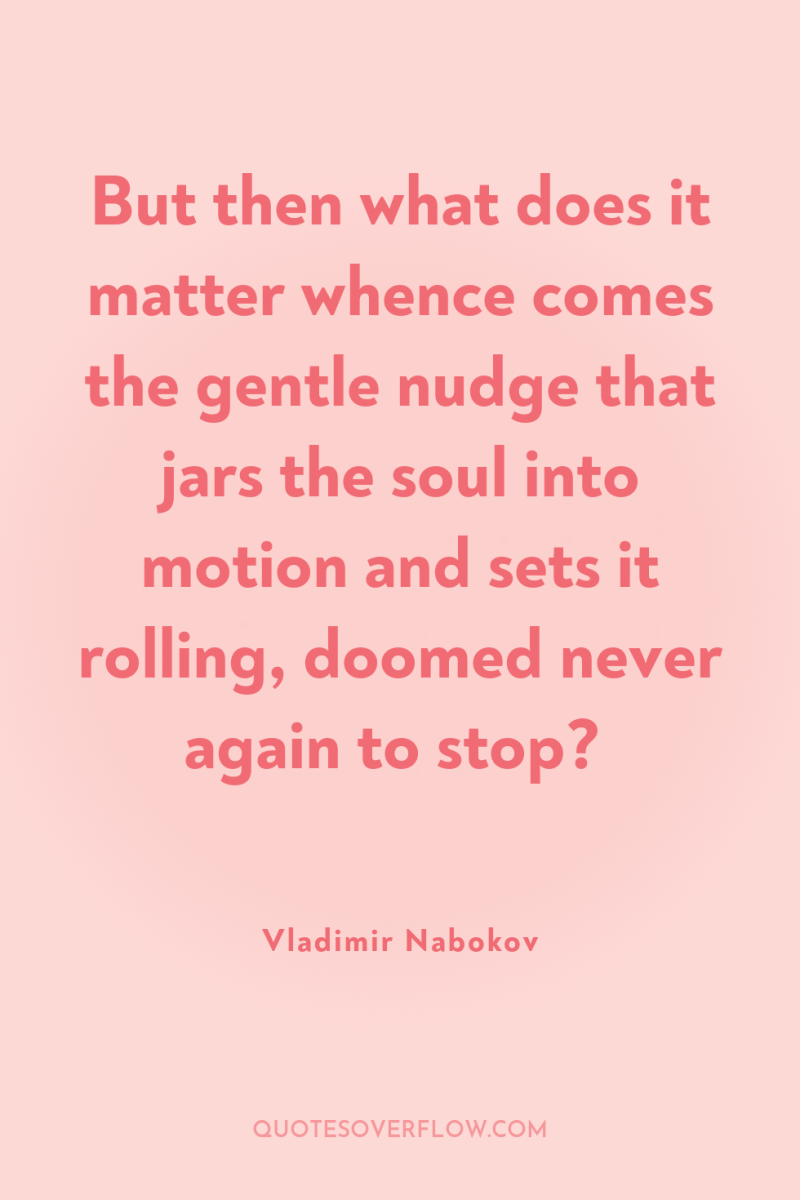
52
But then what does it matter whence comes the gentle nudge that jars the soul into motion and sets it rolling, doomed never again to stop?Vladimir Nabokov
53
A writer should have the precision of a poet and the imagination of a scientist.Vladimir Nabokov
54
A work of art has no importance whatever to society. It is only important to the individual.Vladimir Nabokov
55
It's a pity one can't imagine what one can't compare to anything. Genius is an African who dreams up snow.Vladimir Nabokov
56
At eight, he had once told his mother that he wanted to paint air.Vladimir Nabokov
57
As if it were a point of honor–which, indeed, a point of art often is.Vladimir Nabokov
58
I discovered in nature the non utilitarian delights that I sought in art. Both were a form of magic, both were a game of intricate enchantment and deception.Vladimir Nabokov
59
A wise reader reads the book of genius not with his heart, not so much with his brain, but with his spine. It is there that occurs the telltale tingle...Vladimir Nabokov
60
I would like to spare the time and effort of hack reviewers and, generally, persons who move their lips when reading.Vladimir Nabokov
61
She is a great gobbler of books, but reads only trash, memorizing nothing and leaving out the longer descriptions.Vladimir Nabokov
62
Doom is nigh. I am in acute distress, desperately trying to coax sleep, opening my eyes every few seconds to check their faded gleam, and imagining paradise as a place where a sleepless neighbor reads an endless book by the light of an eternal candle.Vladimir Nabokov
63
Devices which in some curious new way imitate nature are attractive to simple minds.Vladimir Nabokov
64
No free man needs a God; but was I free? How fully I felt nature glued to me And how my childish palate loved the taste Half-fish, half-honey, of that golden paste! My picture book was at an early age The painted parchment papering our cage: Mauve rings around the moon; blood-orange sun; Twinned Iris; and that rare phenomenon The iridule - when, beautiful and strange, In a bright sky above a mountain range One opal cloudlet in an oval form Reflects the rainbow of a thunderstorm Which in a distant valley has been staged -For we are most artistically caged.Vladimir Nabokov
65
To each, or about each, of his colleagues he had said at one time or other, something... something impossible to recall in this or that case and difficult to define in general terms -- some careless bright and harsh trifle that had grazed a stretch of raw flesh.Vladimir Nabokov
66
My loathings are simple. stupidity, oppression, crime, cruelty, soft music.Vladimir Nabokov
67
His heart missed a beat and never regretted the lovely loss.Vladimir Nabokov
68
I mean, I have the feeling that something in my mind is poisoning everything else.Vladimir Nabokov
69
We loved each other with a premature love, marked by a fierceness that so often destroys adult lives. I was a strong lad and survived; but the poison was in the wound, and the wound remained ever openVladimir Nabokov
70
Lolita, light of my life, fire of my loins. My sin, my soul. Lo-lee-ta: the tip of the tongue taking a trip of three steps down the palate to tap, at three, on the teeth. Lo. Lee. Ta. She was Lo, plain Lo, in the morning, standing four feet ten in one sock. She was Lola in slacks. She was Dolly at school. She was Dolores on the dotted line. But in my arms she was always Lolita.Vladimir Nabokov
71
Reality is a very subjective affair. I can only define it as a kind of gradual accumulation of information; and as specialization. If we take a lily, for instance, or any other kind of natural object, a lily is more real to a naturalist than it is to an ordinary person. But it is still more real to a botanist. And yet another stage of reality is reached with that botanist who is a specialist in lilies. You can get nearer and nearer, so to speak, to reality; but you never get near enough because reality is an infinite succession of steps, levels of perception, false bottoms, and hence unquenchable, unattainable. You can know more and more about one thing but you can never know everything about one thing: it’s hopeless. So that we live surrounded by more or less ghostly objects– that machine, there, for instance. It’s a complete ghost to me– I don’t understand a thing about it and, well, it’s a mystery to me, as much of a mystery as it would be to Lord Byron.Vladimir Nabokov
72
The pleasures of writing correspond exactly to the pleasures of readingVladimir Nabokov
73
I discovered there was an endless source of robust enjoyment in trifling with psychiatrists.Vladimir Nabokov
74
A destiny in the making is, believe me, not one of those honest mystery stories where all you have to do is keep an eye on the clues. In my youth I once read a French detective tale where the clues were actually in italics; but that is not McFate’s way – even if one does learn to recognize certain obscure indications.Vladimir Nabokov
75
I sometimes used to ask myself, what on earth did I love her for? Maybe fore the warm hazel iris of her fluffy eyes, or for the natural side-wave of her brown hair, done anyhow, or again for that movement of her plump shoulders. But, probably the truth was that I loved her because she loved me. To her I was the ideal man: brains, pluck. And there was none dressed better. I remember once, when I first put on that new dinner jacket, with the vast trousers, she clapsed her hands, sank down on a chair and murmured: 'Oh, Hermann.." It was ravishment bordering upon something like heavenly woe.Vladimir Nabokov
76
This irritated or puzzled such students of literature and their professors as were accustomed to ‘serious’ courses replete with ‘trends ’ and ‘schools ’ and ‘myths ’ and ‘symbols ’ and ‘social comment ’ and something unspeakably spooky called ‘climate of thought.’ Actually these ‘serious’ courses were quite easy ones with the students required to know not the books but about the books.Vladimir Nabokov
77
And speaking of this wonderful machine:[840] I’m puzzled by the difference bVladimir Nabokov
78
... she had painted her lips and was holding in her hollowed hands a beautiful, banal, Eden-red apple.Vladimir Nabokov
79
I have often noticed that we are inclined to endow our friends with the stability of type that literary characters acquire in the reader's mind. No matter how many times we reopen 'King Lear, ' never shall we find the good king banging his tankard in high revelry, all woes forgotten, at a jolly reunion with all three daughters and their lapdogs. Never will Emma rally, revived by the sympathetic salts in Flaubert's father's timely tear. Whatever evolution this or that popular character has gone through between the book covers, his fate is fixed in our minds, and, similarly, we expect our friends to follow this or that logical and conventional pattern we have fixed for them. .Vladimir Nabokov
80
Vladimir Nabokov“.. one cannot read a book: one can only reread it. A good reader, a major reader, an active and creative reader is a rereader. And I shall tell you why. When we read a book for the first time the very process of laboriously moving our eyes from left to right, line after line, page after page, this complicated physical work upon the book, the very process of learning in terms of space and time what the book is about, this stands between us and artistic appreciation. When we look at a painting we do no have to move our eyes in a special way even if, as in a book, the picture contains elements of depth and development. The element of time does not really enter in a first contact with a painting. In reading a book, we must have time to acquaint ourselves with it. We have no physical organ (as we have the eye in regard to a painting) that takes in the whole picture and can enjoy its details. But at a second, or third, or fourth reading we do, in a sense, behave towards a book as we do towards a painting. However, let us not confuse the physical eye, that monstrous achievement of evolution, with the mind, an even more monstrous achievement. A book, no matter what it is - a work of fiction or a work of science (the boundary line between the two is not as clear as is generally believed) - a book of fiction appeals first of all to the mind. The mind, the brain, the top of the tingling spine, is, or should be, the only instrument used upon a book.” ― Vladimir Nabokov, Lectures on Literature.Vladimir Nabokov
81
For me a work of fiction exists only insofar as it affords me what I shall bluntly call aesthetic bliss, that is a sense of being somehow, somewhere, connected with other states of being where art (curiosity, tenderness, kindness, ecstasy) is the norm. There are not many such books. All the rest is either topical trash or what some call the Literature of Ideas, which very often is topical trash coming in huge blocks of plaster that are carefully transmitted from age to age until somebody comes along with a hammer and takes a good crack at Balzac, at Gorki, at Mann.Vladimir Nabokov
82
In this course I have tried to reveal the mechanism of those wonderful toys – literary masterpieces. I have tried to make of you good readers who read books not for the infantile purpose of identifying oneself with the characters, and not for the adolescent purpose of learning to live, and not for the academic purpose of indulging in generalizations. I have tried to teach you to read books for the sake of their form, their visions, their art. I have tried to teach you to feel a shiver of artistic satisfaction, to share not the emotions of the people in the book but the emotions of its author – the joys and difficulties of creation. We did not talk around books, about books; we went to the center of this or that masterpiece, to the live heart of the matter.Vladimir Nabokov
83
There are gentle souls who would pronounce Lolita meaningless because it does not teach them anything. I am neither a reader nor a writer of didactic fiction, and, despite John Ray's assertion, Lolita has no moral in tow. For me a work of fiction exists only insofar as it affords me what I shall bluntly call aesthetic bliss, that is a sense of being somehow, somewhere, connected with other states of being where art (curiosity, tenderness, kindness, ecstasy) is the norm. There are not many such books. All the rest is either topical trash or what some call the Literature of Ideas, which very often is topical trash coming in huge blocks of plaster that are carefully transmitted from age to age until somebody comes along with a hammer and takes a good crack at Balzac, at Gorki, at Mann.Vladimir Nabokov
84
Great novels are above all great fairy tales .. . literature does not tell the truth but makes it up.Vladimir Nabokov
85
I will not mention the name (and what bits of it I happen to give here appear in decorous disguise) of that man, that Franco-Hungarian writer.. I would rather not dwell upon him at all, but I cannot help it– he is surging up from under my pen. Today one does not hear much about him; and this is good, for it proves that I was right in resisting his evil spell, right in experiencing a creepy chill down my spine whenever this or that new book of his touched my hand. The fame of his likes circulates briskly but soon grows heavy and stale; and as for history it will limit his life story to the dash between two dates. Lean and arrogant, with some poisonous pun ever ready to fork out and quiver at you, and with a strange look of expectancy in his dull brown veiled eyes, this false wag had, I daresay, an irresistible effect on small rodents. Having mastered the art of verbal invention to perfection, he particularly prided himself on being a weaver of words, a title he valued higher than that of a writer; personally, I never could understand what was the good of thinking up books, of penning things that had not really happened in some way or other; and I remember once saying to him as I braved the mockery of his encouraging nods that, were I a writer, I should allow only my heart to have imagination, and for the rest rely upon memory, that long-drawn sunset shadow of one’s personal truth. I had known his books before I knew him; a faint disgust was already replacing the aesthetic pleasure which I had suffered his first novel to give me. At the beginning of his career, it had been possible perhaps to distinguish some human landscape, some old garden, some dream- familiar disposition of trees through the stained glass of his prodigious prose.. but with every new book the tints grew still more dense, the gules and purpure still more ominous; and today one can no longer see anything at all through that blazoned, ghastly rich glass, and it seems that were one to break it, nothing but a perfectly black void would face one’s shivering soul. But how dangerous he was in his prime, what venom he squirted, with what whips he lashed when provoked! The tornado of his passing satire left a barren waste where felled oaks lay in a row, and the dust still twisted, and the unfortunate author of some adverse review, howling with pain, spun like a top in the dust. .Vladimir Nabokov
86
Cynthia had been on friendly terms with an eccentric librarian called Porlock who in the last years of his dusty life had been engaged in examining old books for miraculous misprints such as the substitution of "1" for the second "h" in the word "hither." Contrary to Cynthia, he cared nothing for the thrill of obscure predictions; all he sought was the freak itself, the chance that mimics choice, the flaw that looks like a flower; and Cynthia, a much more perverse amateur of misshapen or illicitly connected words, puns, logogriphs, and so on, had helped the poor crank to pursue a quest that in the light of the example she cited struck me as statistically insane. ("The Vane Sisters") .Vladimir Nabokov
87
Dear Jesus, do something.Vladimir Nabokov
88
In a sense, we are all crashing to our death from the top story of our birth ... and wondering with an immortal Alice at the patterns of the passing wall. This capacity to wonder at trifles - no matter the imminent peril - these asides of the spirit ... are the highest form of consciousness.Vladimir Nabokov
89
The cradle rocks above an abyss, and common sense tells us that our existence is but a brief crack of light between two eternities of darkness. Although the two are identical twins, man, as a rule, views the prenatal abyss with more calm than the one he is heading for.Vladimir Nabokov
90
The lost glove is happy.Vladimir Nabokov
91
The spiritual and the physical had been blended in us with a perfection that must remain incomprehensible to the matter-of-fact, crude, standard-brained youngsters of today. Long after her death I felt her thoughts floating through mine. Long before we met we had had the same dreams.Vladimir Nabokov
92
Our imagination flies -- we are its shadow on the earth.Vladimir Nabokov
93
Some might think that the creativity, imagination, and flights of fancy that give my life meaning are insanity.Vladimir Nabokov
94
[S]urely the Cupid serving him was lefthanded, with a weak chin and no imagination.Vladimir Nabokov
95
How small the cosmos (a kangaroo's pouch would hold it), how paltry and puny in comparison to human consciousness, to a single individual recollection, and its expression in words!Vladimir Nabokov
96
A sense of security, of well-being, of summer warmth pervades my memory. That robust reality makes a ghost of the present. The mirror brims with brightness; a bumblebee has entered the room and bumps against the ceiling. Everything is as it should be, nothing will ever change, nobody will ever die.Vladimir Nabokov
97
My very photogenic mother died in a freak accident (picnic, lightning) when I was three, and, save for a pocket of warmth in the darkest past, nothing of her subsists within the hollows and dells of memory, over which, if you can still stand my style (I am writing under observation), the sun of my infancy had set: surely, you all know those redolent remnants of day suspended, with the midges, about some hedge in bloom or suddenly entered and traversed by the rambler, at the bottom of a hill, in the summer dusk; a furry warmth, golden midges.Vladimir Nabokov
98
When we remember our former selves, there is always that little figure with its long shadow stopping like an uncertain belated visitor on a lighted threshold at the far end of some impeccably narrowing corridor.Vladimir Nabokov
99
I remember a cartoon depicting a chimney sweep falling from the roof of a tall building and noticing on the way that a signboard had one word spelled wrong, and wondering in his headlong flight why nobody had thought of correcting it. In a sense, we all are crashing to our death from the top story of our birth to the flat stones of the churchyard and wondering with an immortal Alice in Wonderland at the patterns of the passing wall. This capacity to wonder at trifles–no matter the imminent peril–these asides of the spirit, these footnotes in the volume of life are the highest forms of consciousness, and it is in this childishly speculative state of mind, so different from common sense and its logic, that we know the world to be good.Vladimir Nabokov
100
He could swear he did not look back, could not–by any optical chance, or in any prism–have seen her physically as he walked away; and yet, with dreadful distinction, he retained forever a composite picture of her standing where he left her. The picture–which penetrated him, through an eye in the back of his head, through his vitreous spinal canal, and could never be lived down, never–consisted of a selection and blend of such random images and expressions of hers that had affected him with a pang of intolerable remorse at various moments in the past.Vladimir Nabokov